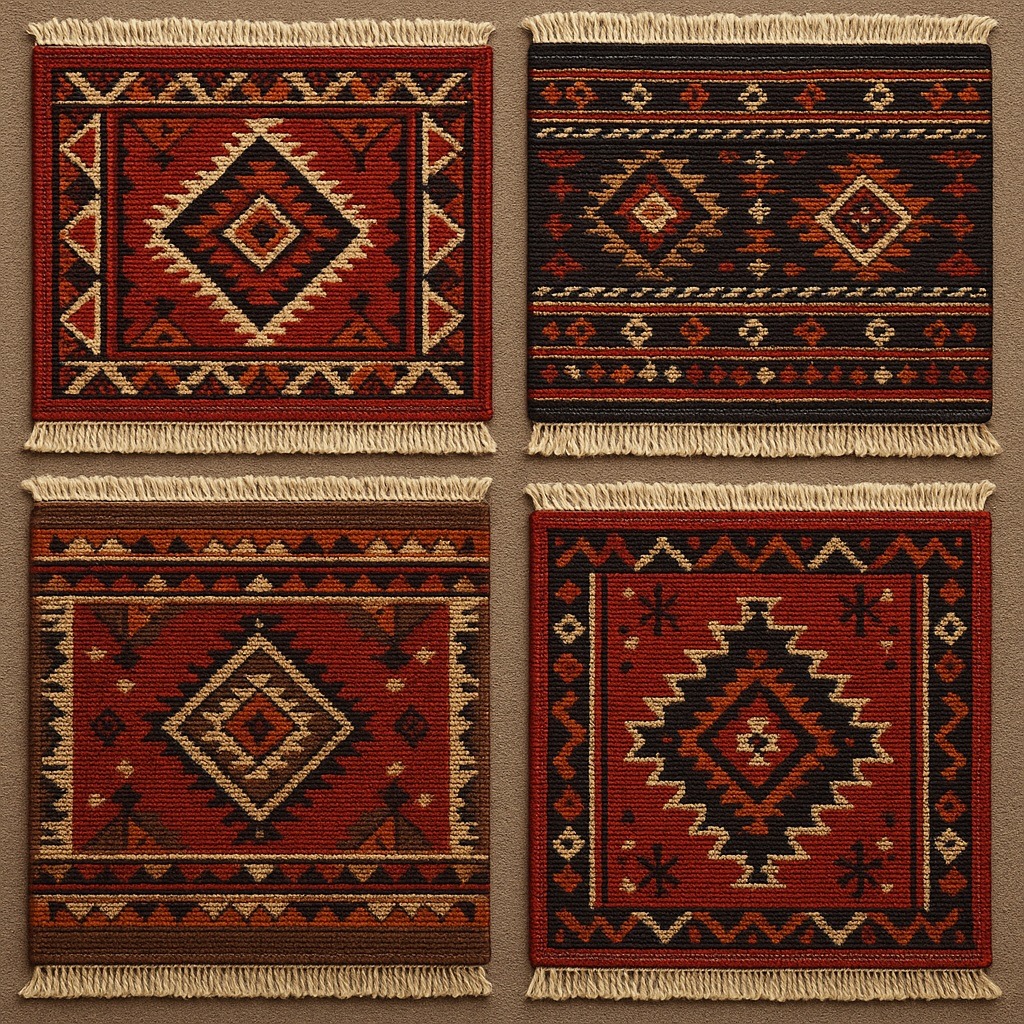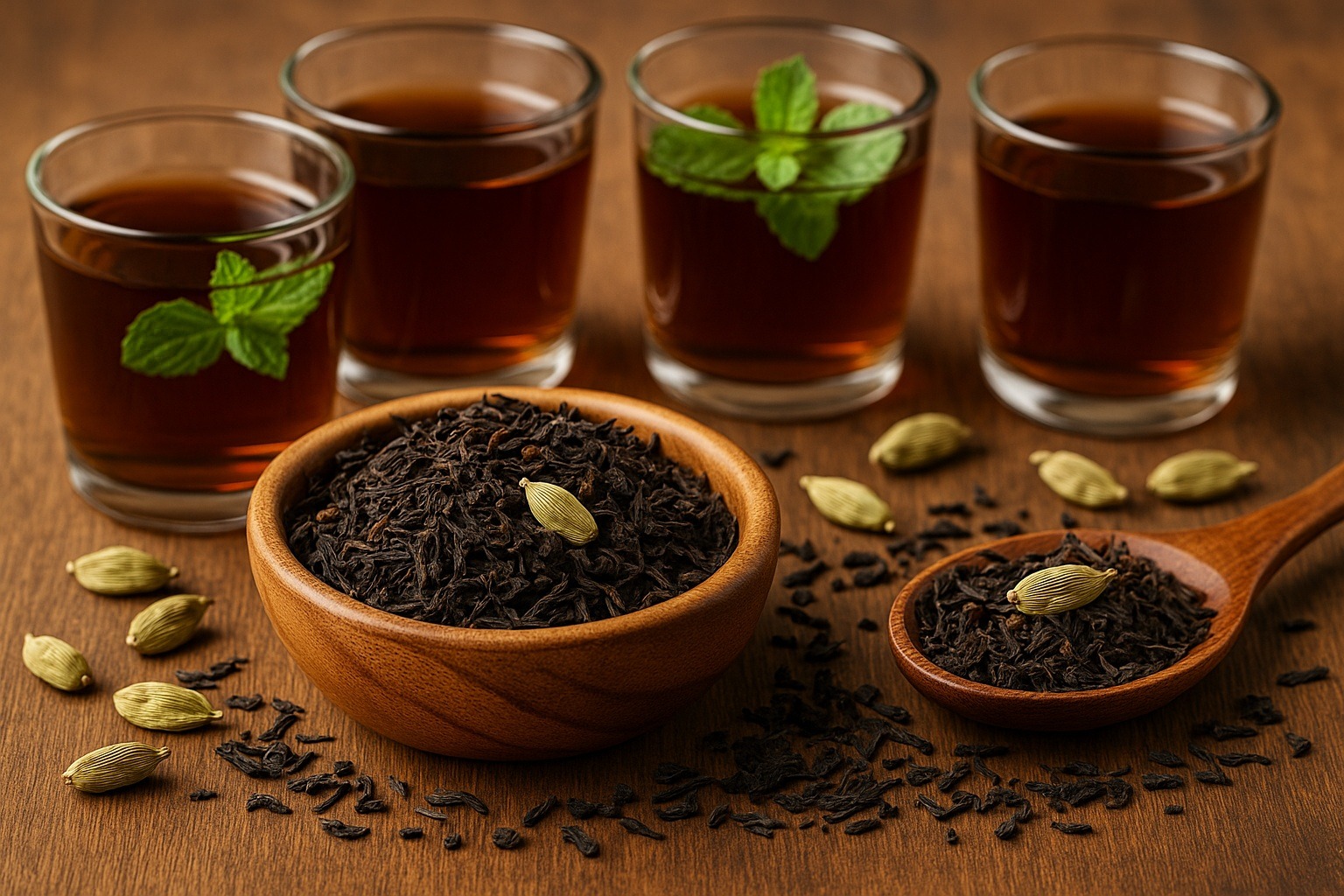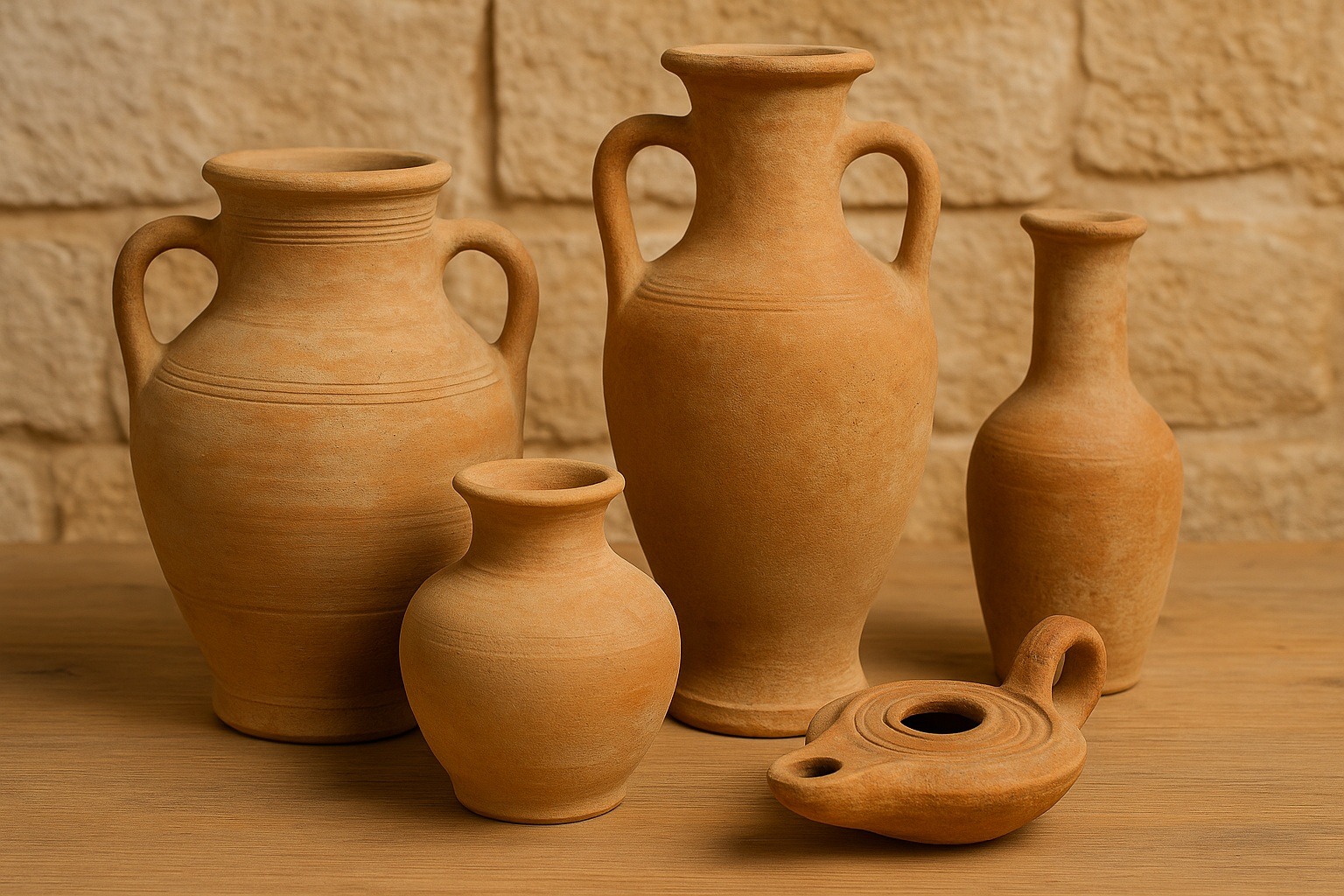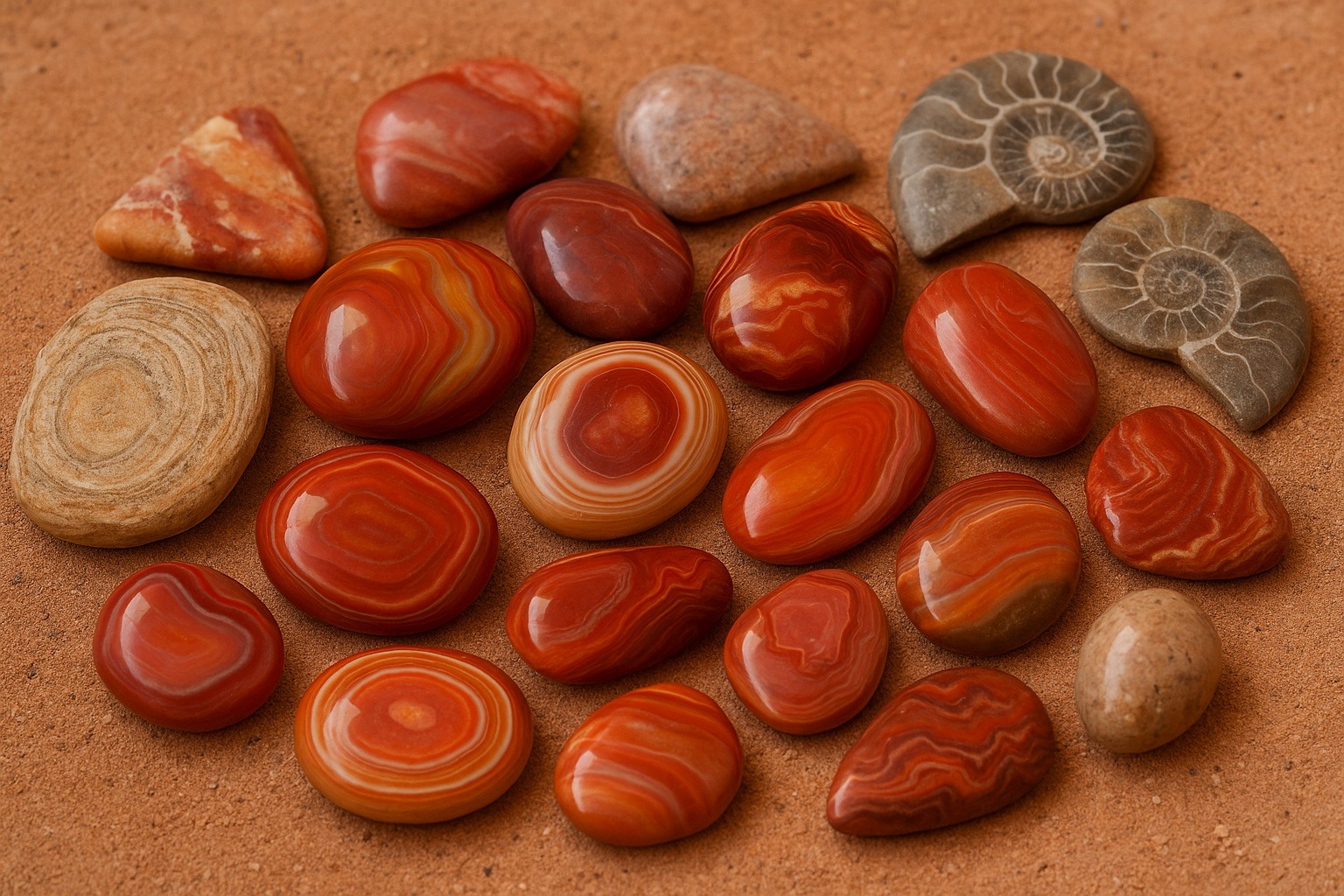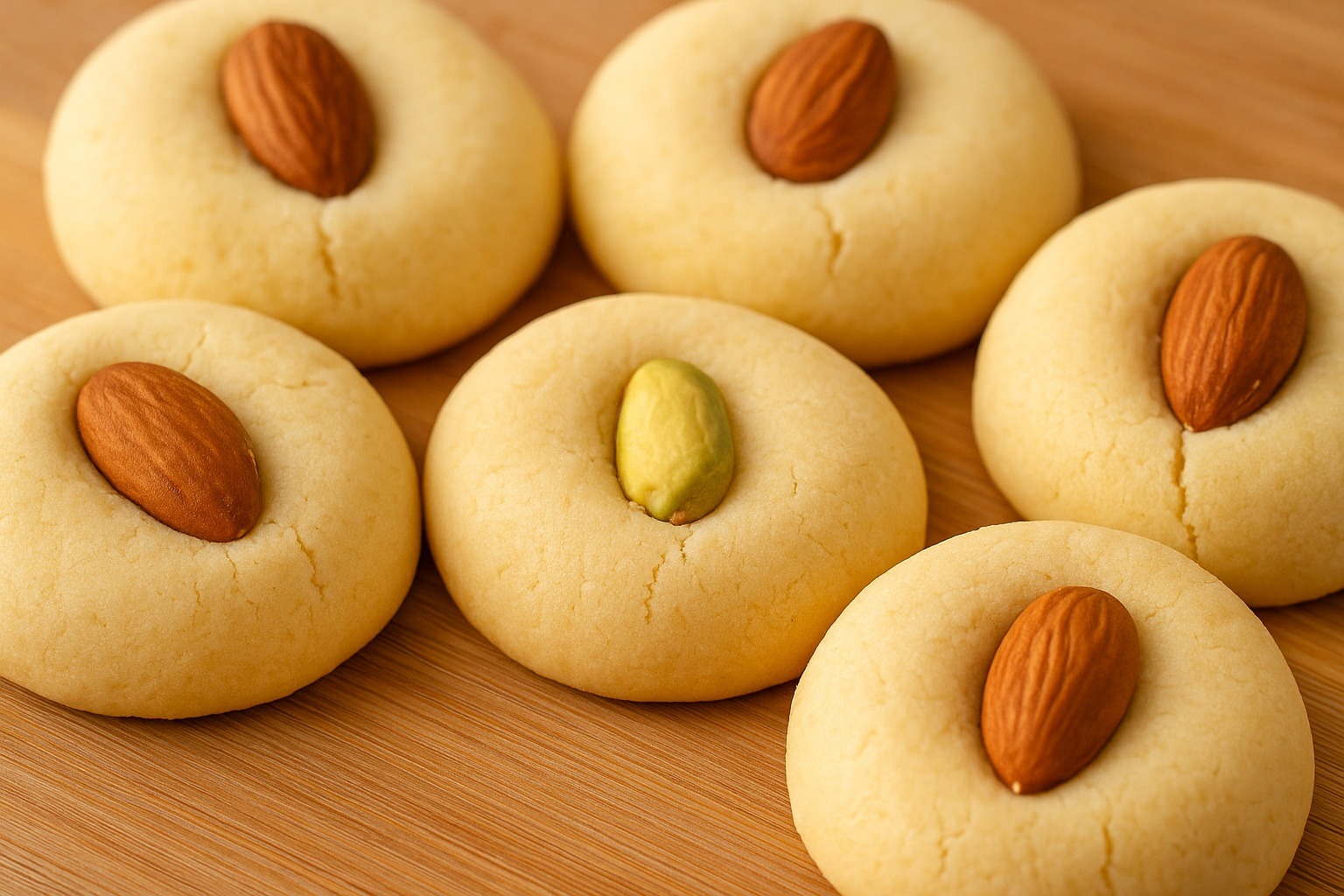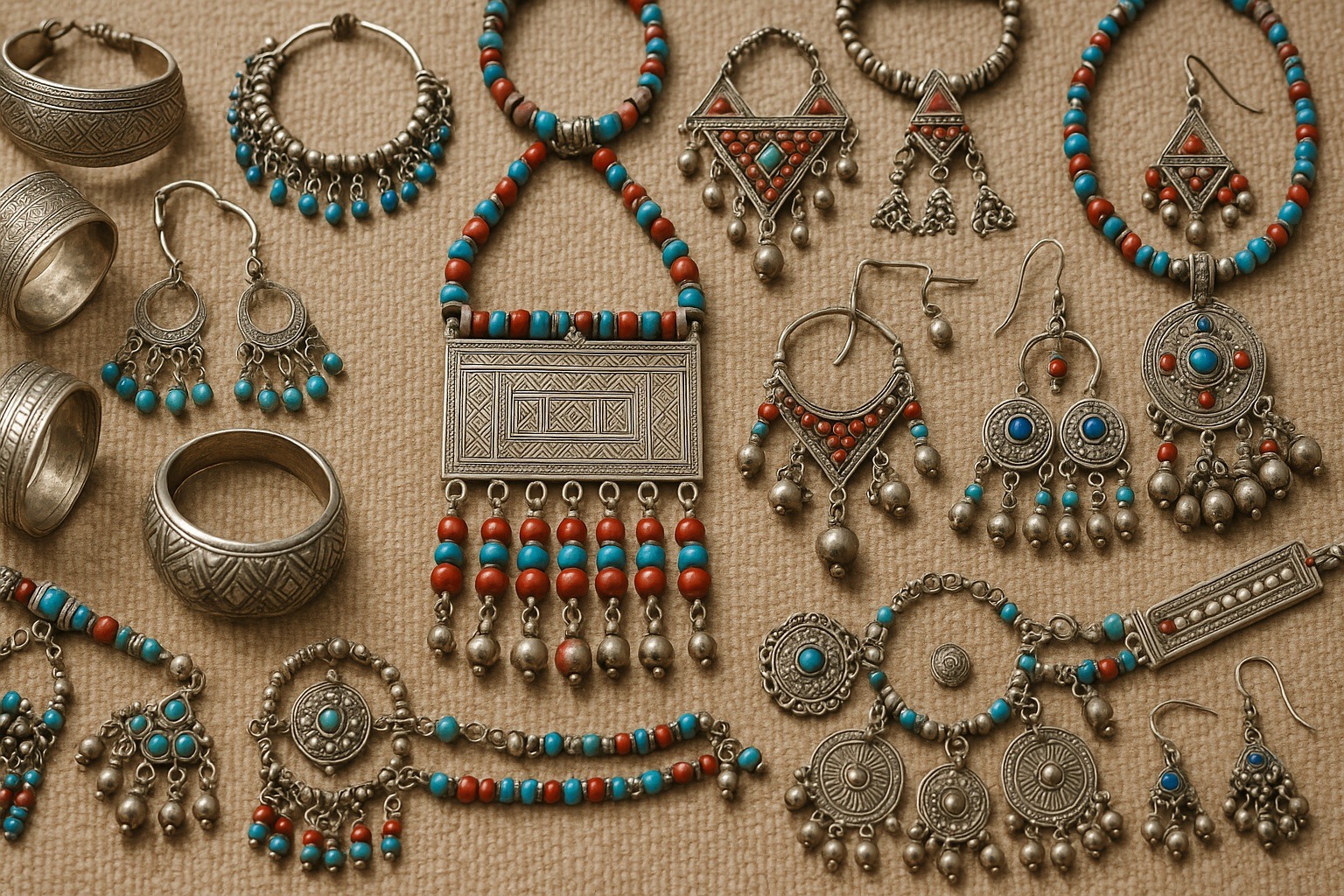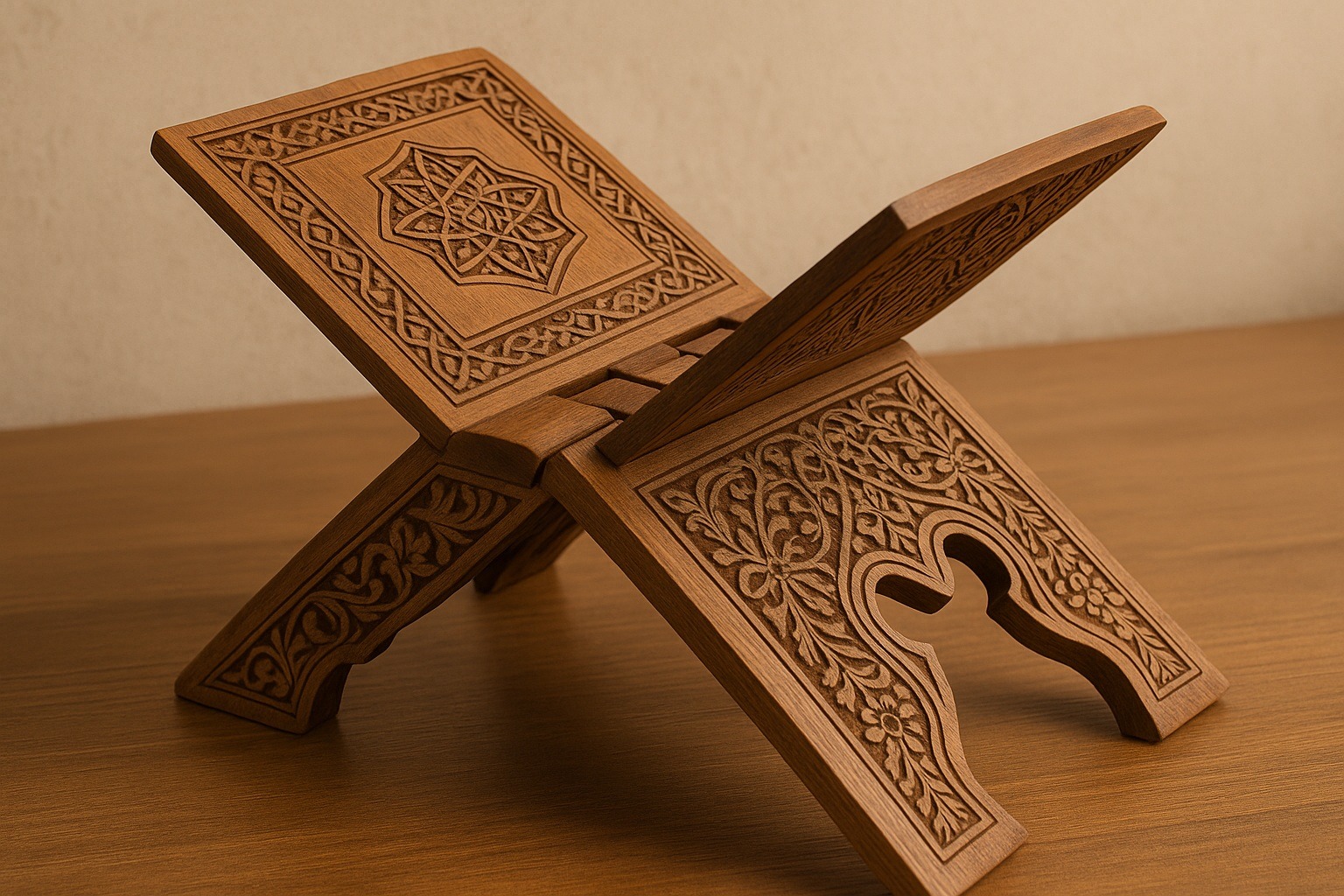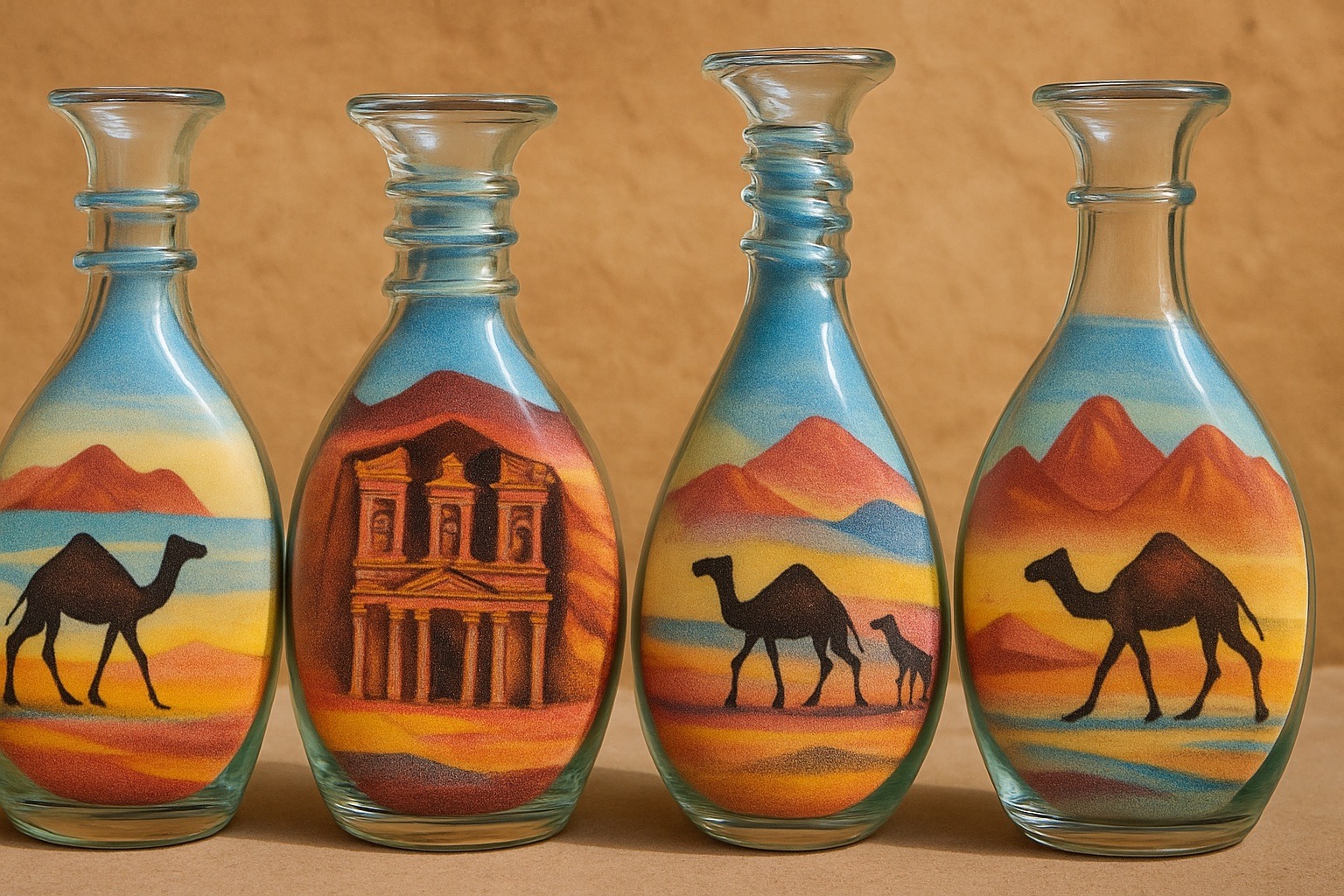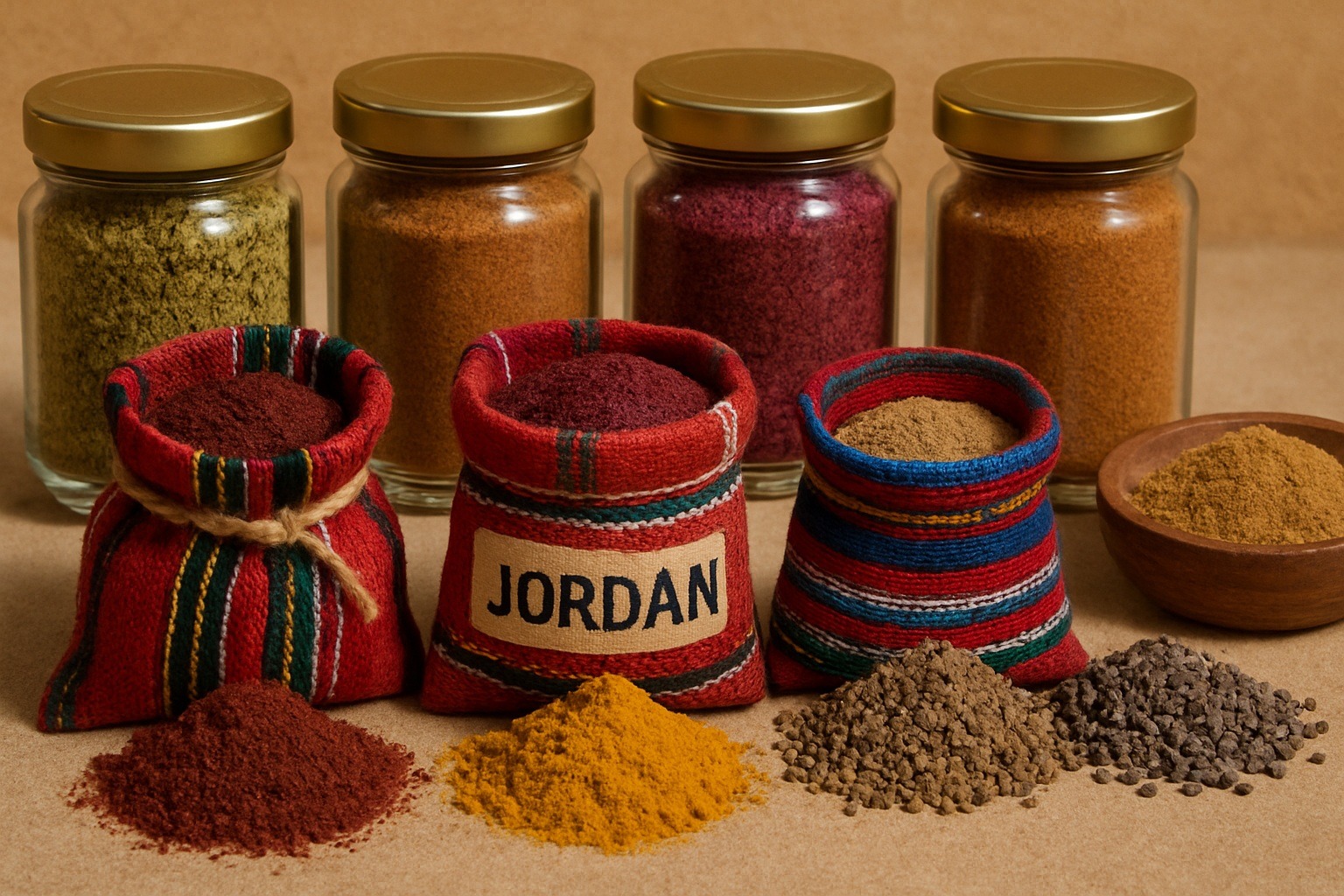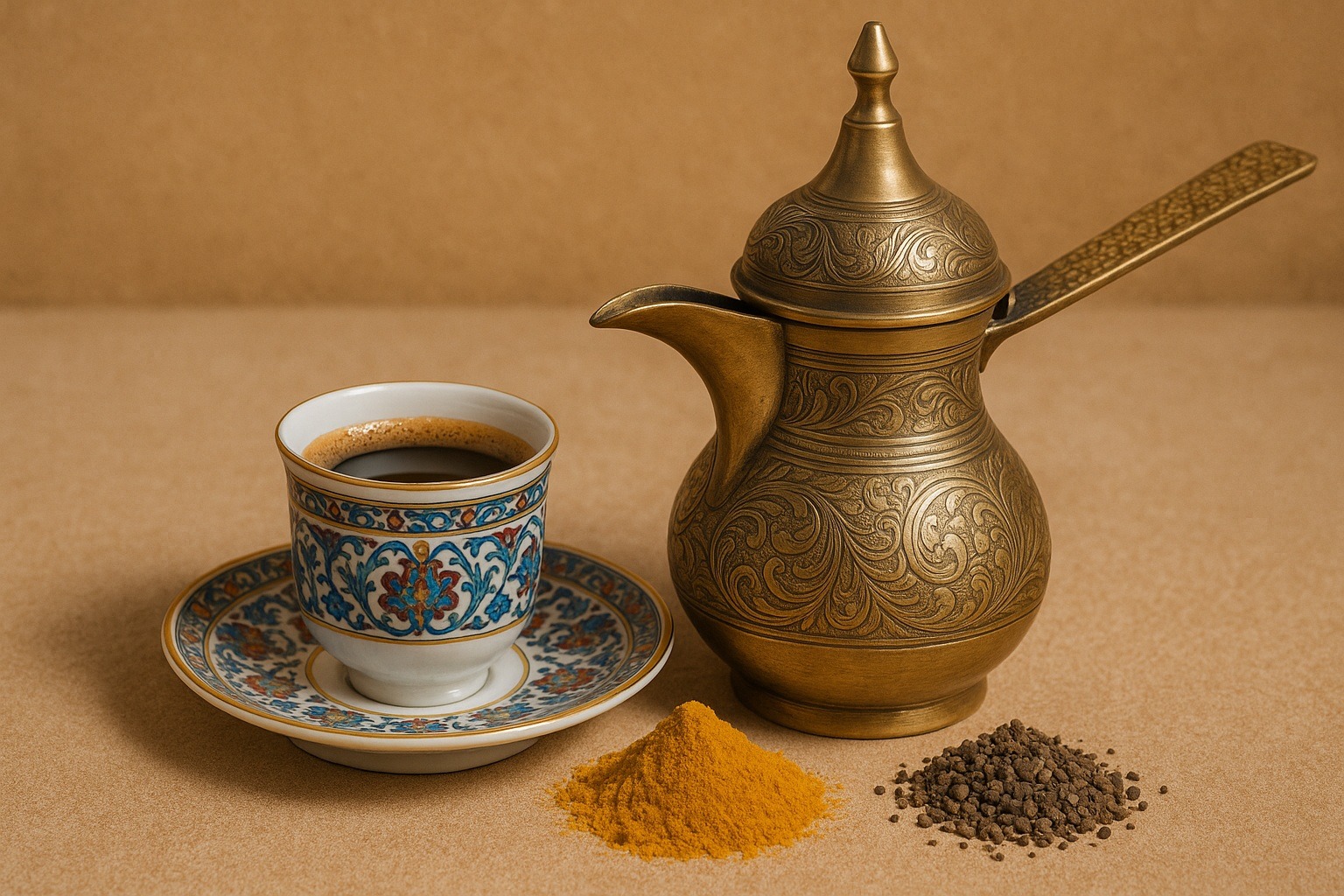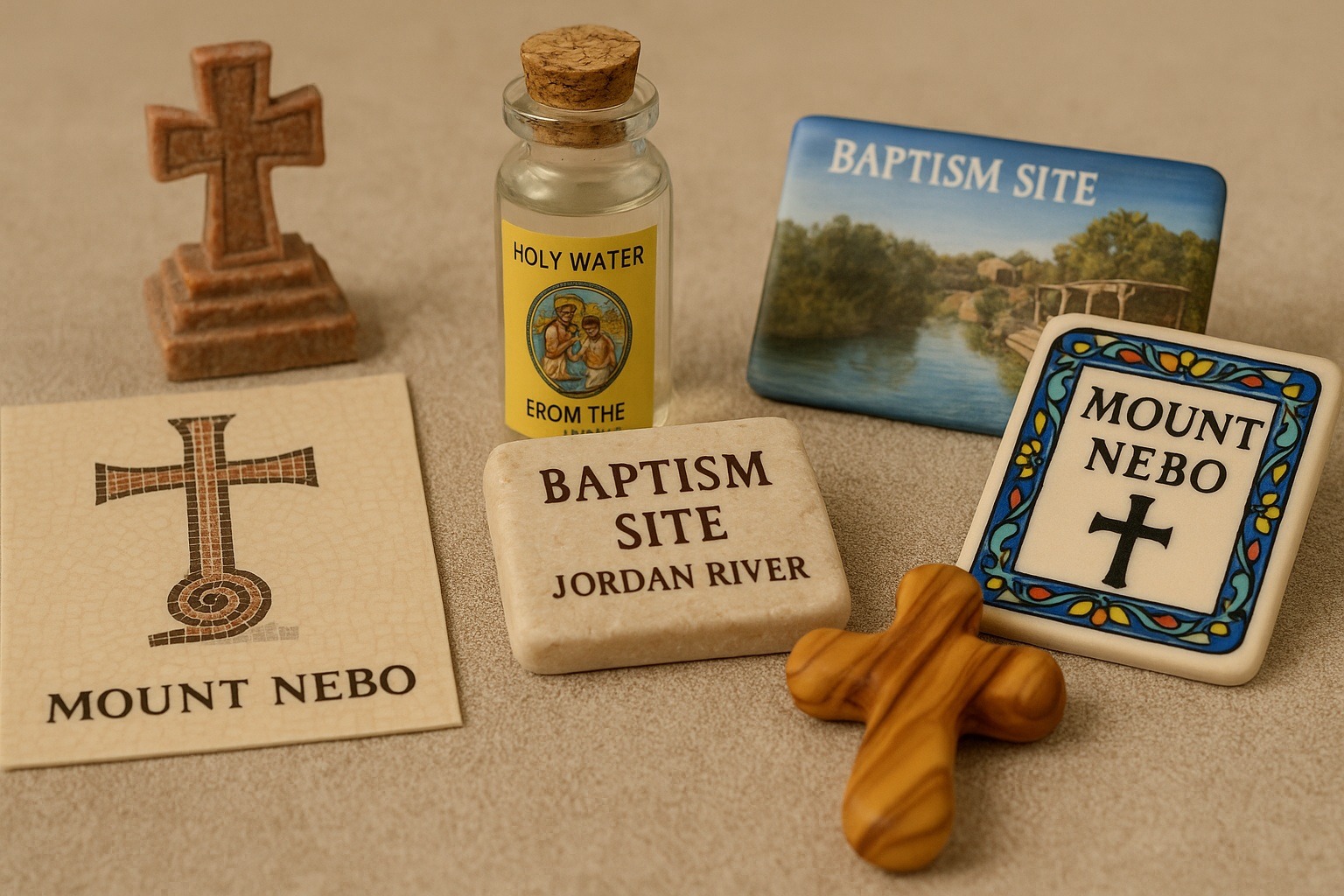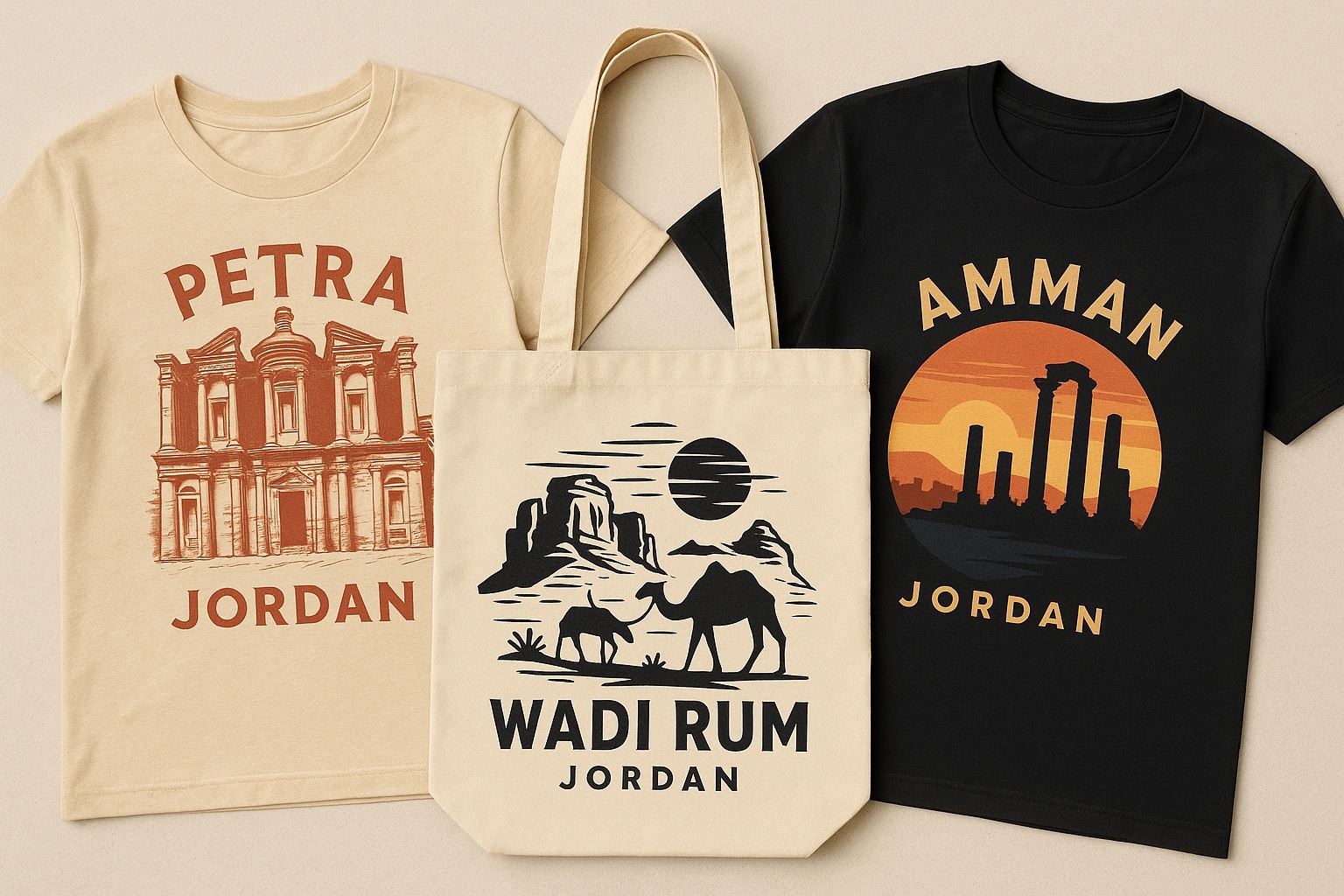Jordan, with its rich historical heritage, impressive nature, and deep-rooted cultural traditions, offers visitors not only a fascinating travel experience but also the opportunity to collect unforgettable memories through unique souvenirs. From the mysterious atmosphere of the ancient city of Petra to the healing mud of the Dead Sea, and from Bedouin culture to Arab cuisine, this diversity is also reflected in the souvenir options. Handmade products found all across Jordan carry both aesthetic and cultural value.
Spices unique to the country, traditional clothing, handmade jewelry, and natural care products reflect the local lifestyle and can become meaningful gifts for your loved ones. This souvenir shopping journey, stretching from the street markets of Amman to the workshops of Madaba, from the desert tents of Wadi Rum to the shores of the Dead Sea, offers the chance to bring home the textures and stories unique to Jordan. The souvenirs you can buy from Jordan preserve the traces and cultural richness of this magical land for many years.
1. Jordanian Olive Oil – Locally produced, high quality, typically sold in gift bottles.
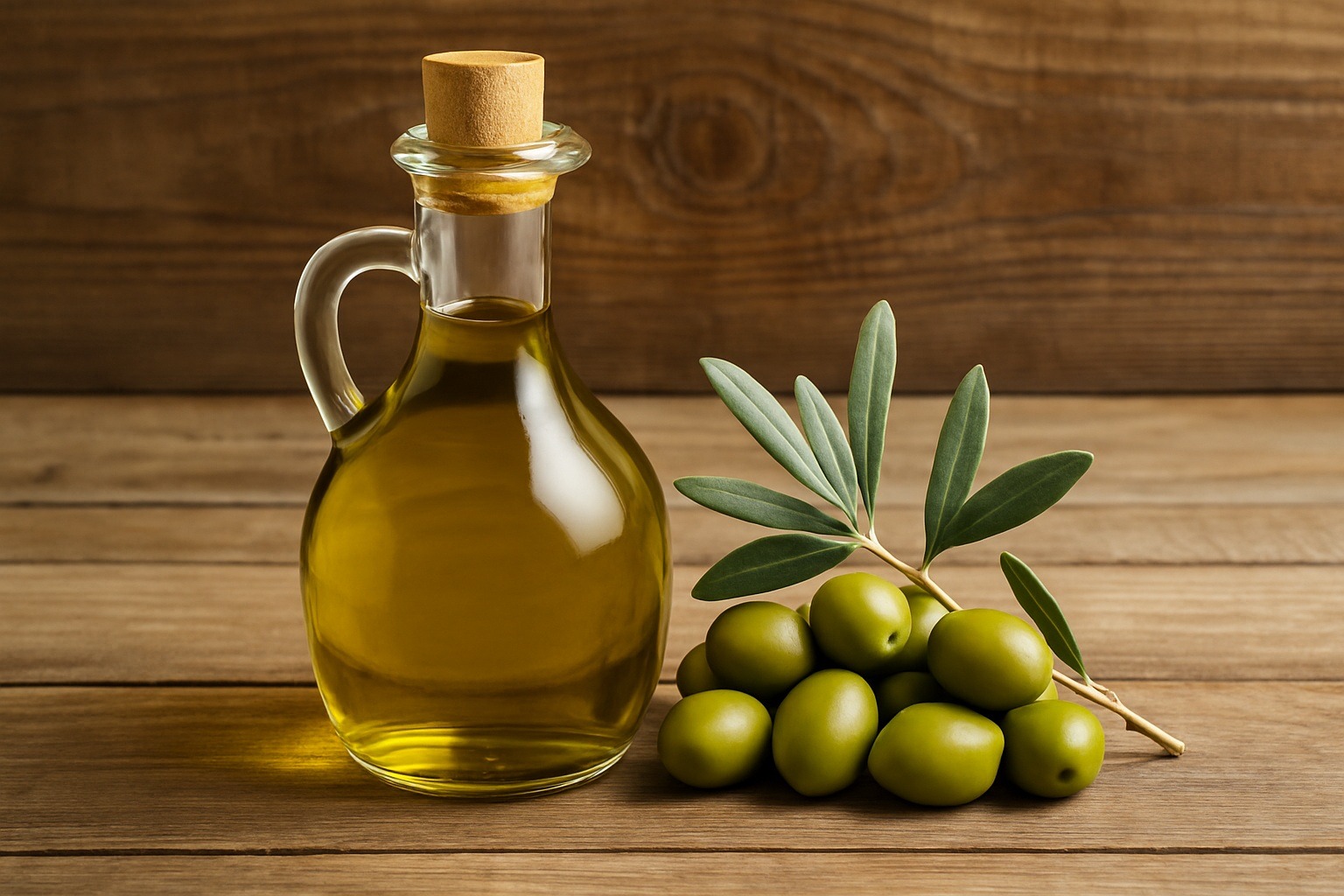
Jordanian olive oil is a high-quality and aromatic product obtained from olive trees grown in the country’s fertile lands. Especially in the northern regions, around Irbid and Ajloun, olives are extensively cultivated and pressed using traditional methods to produce extra virgin olive oil. These oils are notable for being beneficial to health and for their natural, additive-free composition. In Jordanian cuisine, they are widely used—from breakfasts and salads to appetizers and hot dishes.
Olive oil offers tourists visiting Jordan a healthy and authentic gift option. Typically sold in decorative and gift-style glass bottles with elegant packaging, these products are both visually appealing and easy to carry. Especially the organically certified varieties attract the attention of shoppers. If you want to give your loved ones a gift that reflects the naturalness and flavor of Jordan, local olive oils are an excellent choice.
2. Dead Sea Products – Dead Sea mud, salt, and mineral-based skincare products.
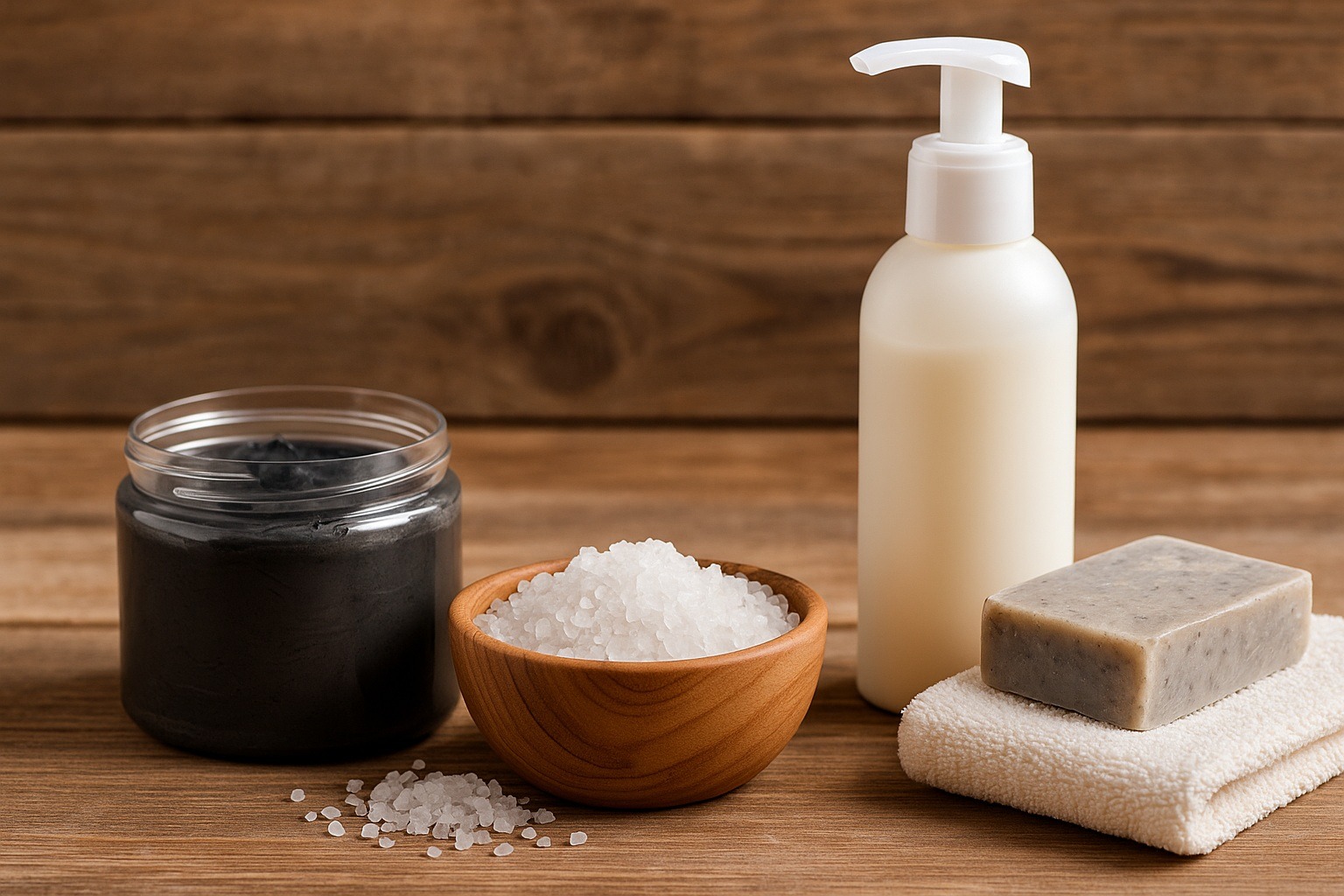
Dead Sea products are derived from the unique mineral-rich composition of the Dead Sea, one of Jordan’s most famous natural resources. This lake, located at the lowest point on Earth, is extremely rich in minerals and is therefore considered a natural remedy in skincare. Especially Dead Sea mud is rich in minerals such as magnesium, calcium, and potassium, and is known for its detoxifying and revitalizing effects on the skin. It is also widely used as a natural treatment for various skin problems.
The salts and mineral-based care products obtained from this special region are offered in various forms such as soap, scrubs, masks, creams, and lotions. Ideal for both women and men, these products are a healthy and luxurious gift option to purchase during your visit to Jordan. Easily found in local shops and hotels around the Dead Sea, they are usually sold in elegantly packaged containers and are very practical to carry. For your loved ones who care about skin health, they make a gift that is both aesthetic and functional.
3. Petra-themed Magnets – Colorful fridge magnets representing the ruins of Petra.
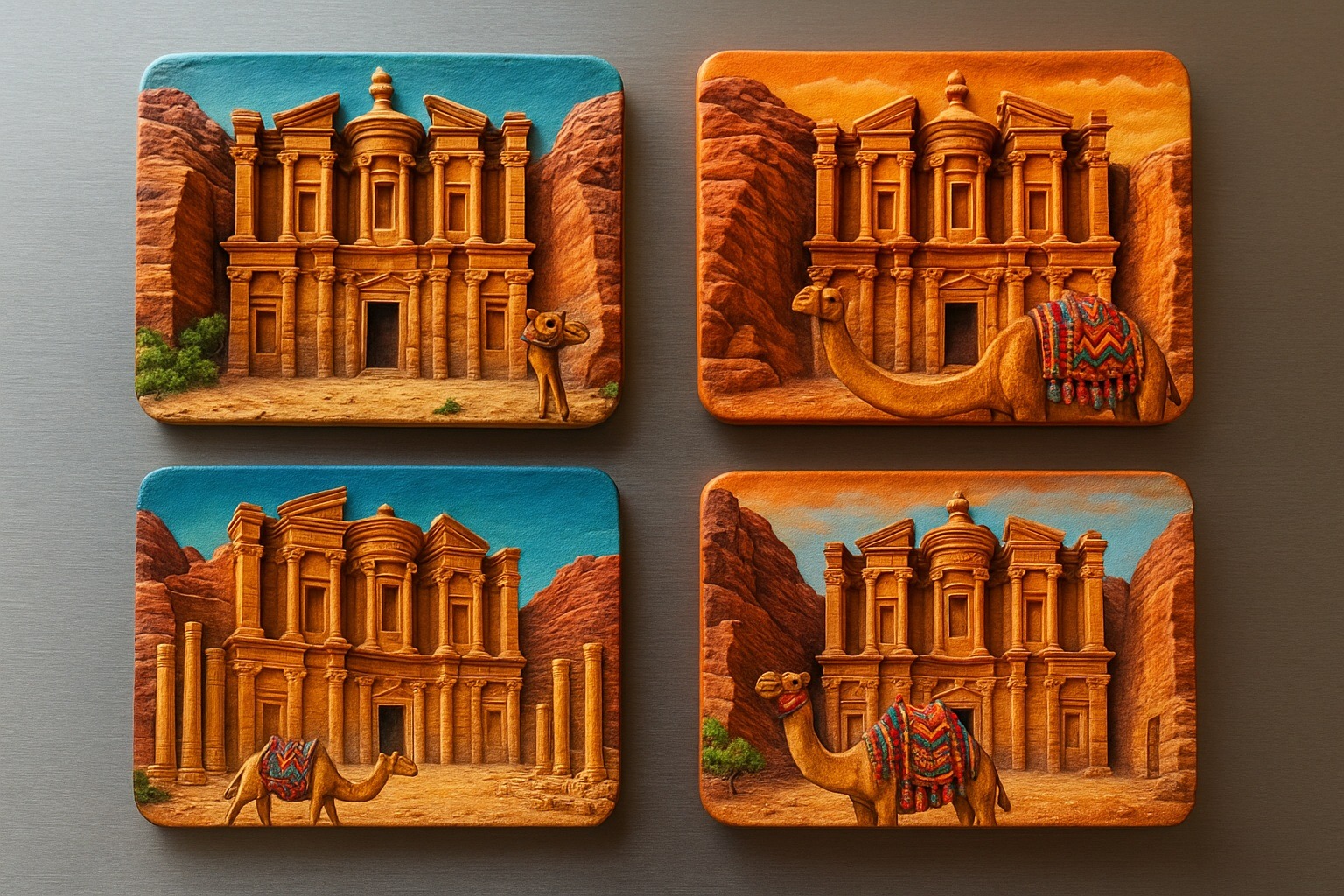
Petra-themed magnets are small yet meaningful souvenirs that feature symbols of Petra, one of Jordan’s most iconic historical sites. These magnets often depict the magnificent structure known as the “Treasury” (Al-Khazneh), rock-cut tombs, ancient columns, and camel figures. With their colorful and eye-catching designs, they create both a decorative and nostalgic look when attached to refrigerators or metal surfaces. Magnets offer an affordable and easy-to-carry memento for tourists visiting Petra.
Available in various designs and sizes in souvenir shops around Petra, tourist stores in Amman, and local market stalls, these items also stand out with handcrafted versions. Some magnets are made from materials like mosaic, ceramic, or wood, while others feature three-dimensional relief images for a more artistic effect. These small decorative items that bring the unique atmosphere of Petra into your home are a practical and stylish way to make your Jordan trip unforgettable.
4. Nabatean Jewelry – Handmade, ancient-style jewelry inspired by Petra.
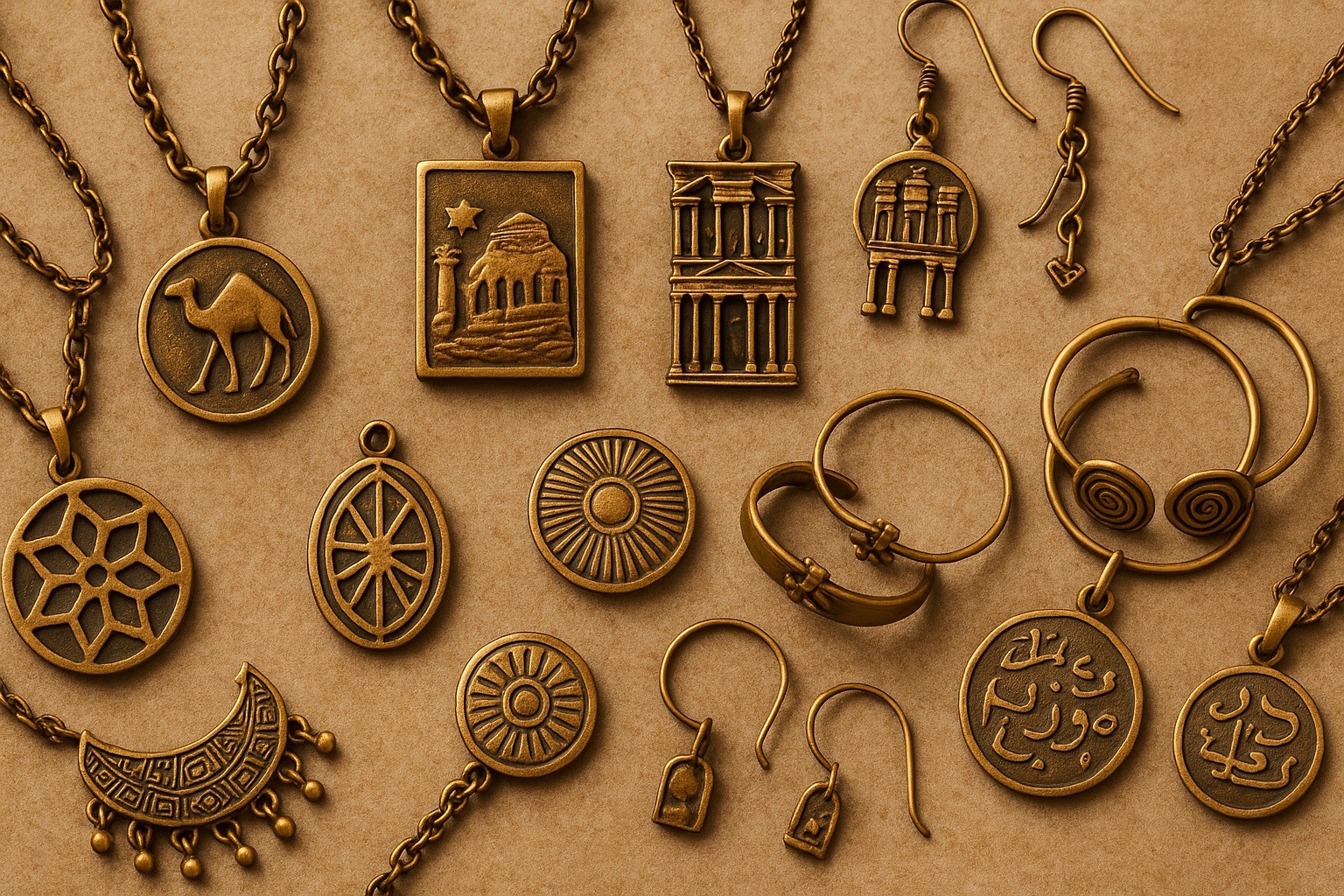
Nabatean jewelry consists of specially designed items inspired by Petra, the historical capital of Jordan, reflecting the aesthetics of the ancient era. These pieces are crafted based on symbols of the Nabatean civilization such as the sun, stars, camels, stone carvings, and Petra’s iconic structures. Typically handmade using materials like bronze, copper, and silver, they often feature ancient inscriptions or geometric patterns. Carrying a traditional and mystical aura, these pieces are meaningful gifts for those interested in history and culture.
Easily found in local design studios and souvenir shops across Jordan, Nabatean jewelry is available in various forms such as necklaces, earrings, bracelets, and rings. Some pieces are further adorned with ancient mosaic stones or colorful glass details, making them even more unique. These items are not only aesthetic accessories but also cultural objects that carry traces of a civilization thousands of years old. If you want to bring your loved ones a gift that is both elegant and meaningful when returning from your trip to Jordan, Nabatean jewelry is a wonderful choice.
5. Arabic Coffee (Qahwa) – Traditional coffee flavored with cardamom.
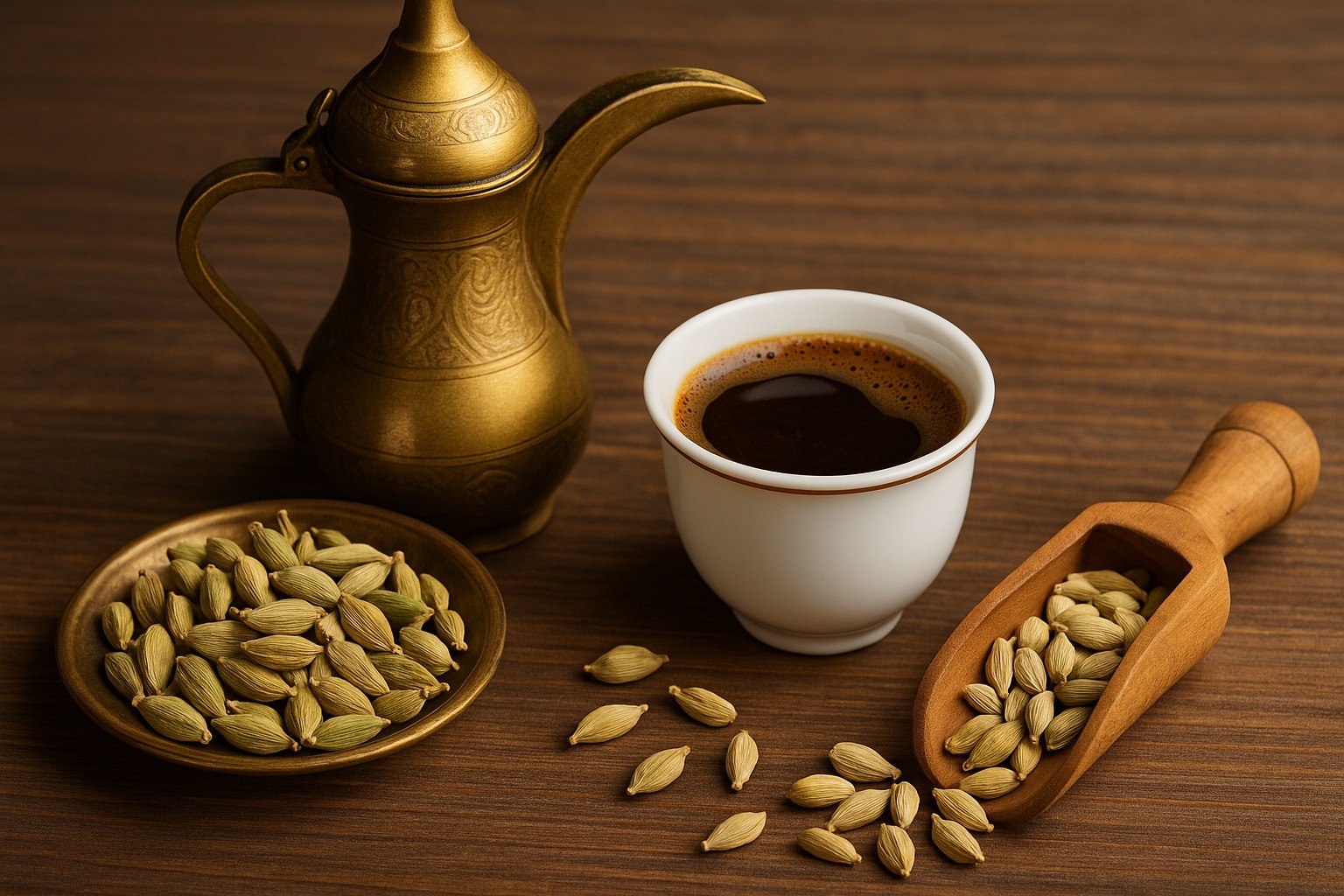
Arabic coffee is one of the oldest traditions of Middle Eastern culture and holds great significance in Jordan as well. Known as “Qahwa,” this coffee differs from classic Turkish coffee in that it is typically light in color, has a thinner consistency, and is flavored with cardamom. Arabic coffee is usually made by finely grinding lightly roasted coffee beans and boiling them for a long time in a special pot similar to a cezve. It has a slightly bitter and spicy taste and is commonly served with dates, Turkish delight, or dried fruits.
In Jordan, Arabic coffee is a symbol of hospitality and plays an important role in traditional ceremonies, celebrations, and welcoming guests. As a gift, it is often presented in special tin boxes or fabric pouches and sold as ground coffee mixed with cardamom. It can also be purchased as part of a set with small porcelain cups (finjan) and metal coffee pots. Arabic coffee is not just a beverage but an experience that reflects the culture of Jordan.
6. Bedouin Clothing – Traditional garments and kaftans of desert people.
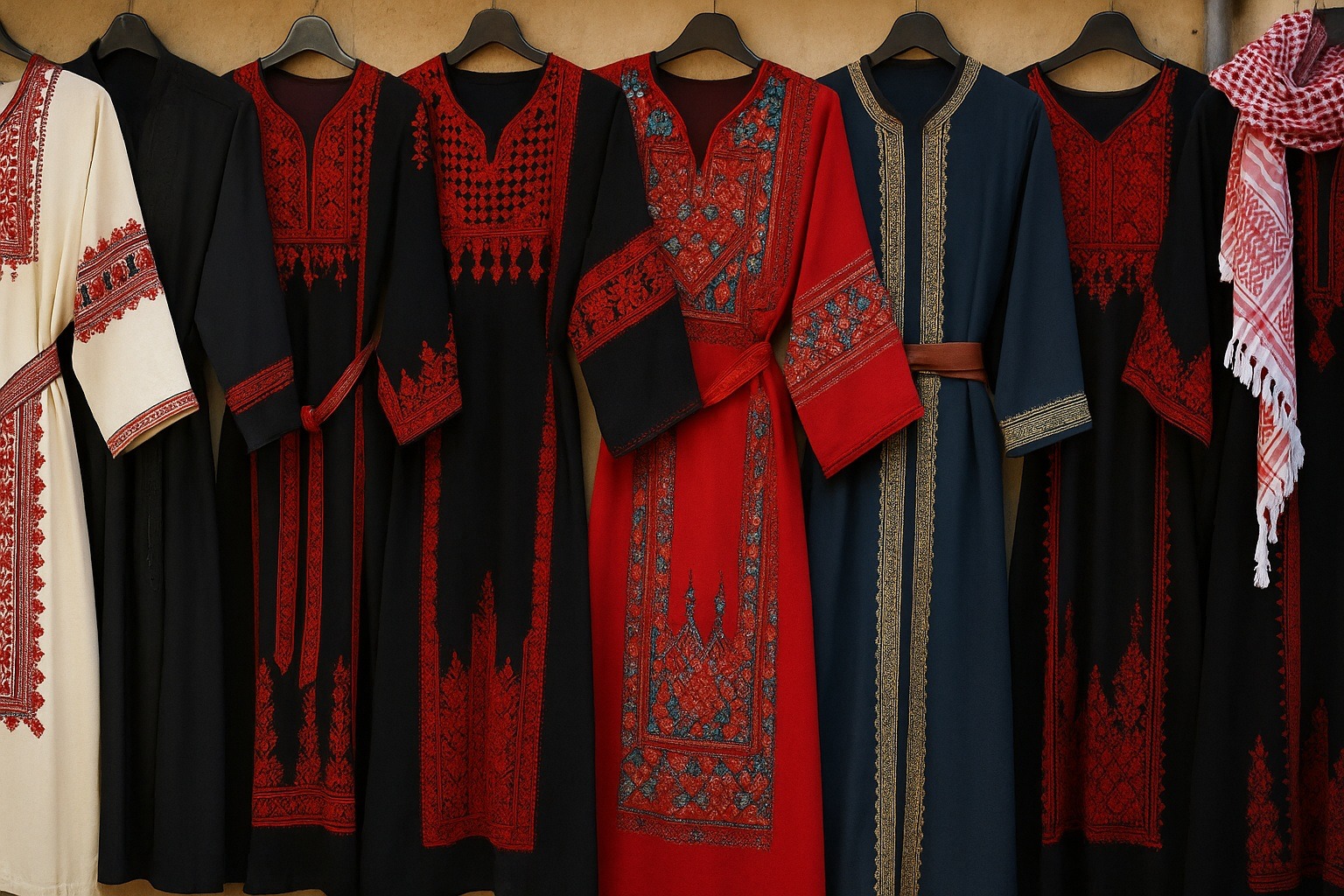
Bedouin clothing represents the desert culture and nomadic lifestyle of Jordan through traditional garments. These clothes are known for their simple yet functional designs for both men and women. Men typically wear long, loose, light-colored garments called “dishdasha” or “thobe,” while women opt for more decorative, embroidered long kaftans. Women’s clothing often features vibrant colors such as red, black, and gold, with traditional patterns and handcrafted details adding uniqueness to the outfits.
These traditional garments are worn not only in daily life but also during weddings, celebrations, and cultural events. For visitors to Jordan, Bedouin clothing offers a culturally rich and authentic gift option. Handmade in local workshops, these garments are usually sold as gift sets that may include a kaftan, scarf, headpiece, or accessories. With their aesthetic appeal and cultural significance, Bedouin garments are special items that reflect the spirit of a journey to Jordan.
7. Keffiyeh (Hatta) – Traditional red-and-white patterned headscarf.
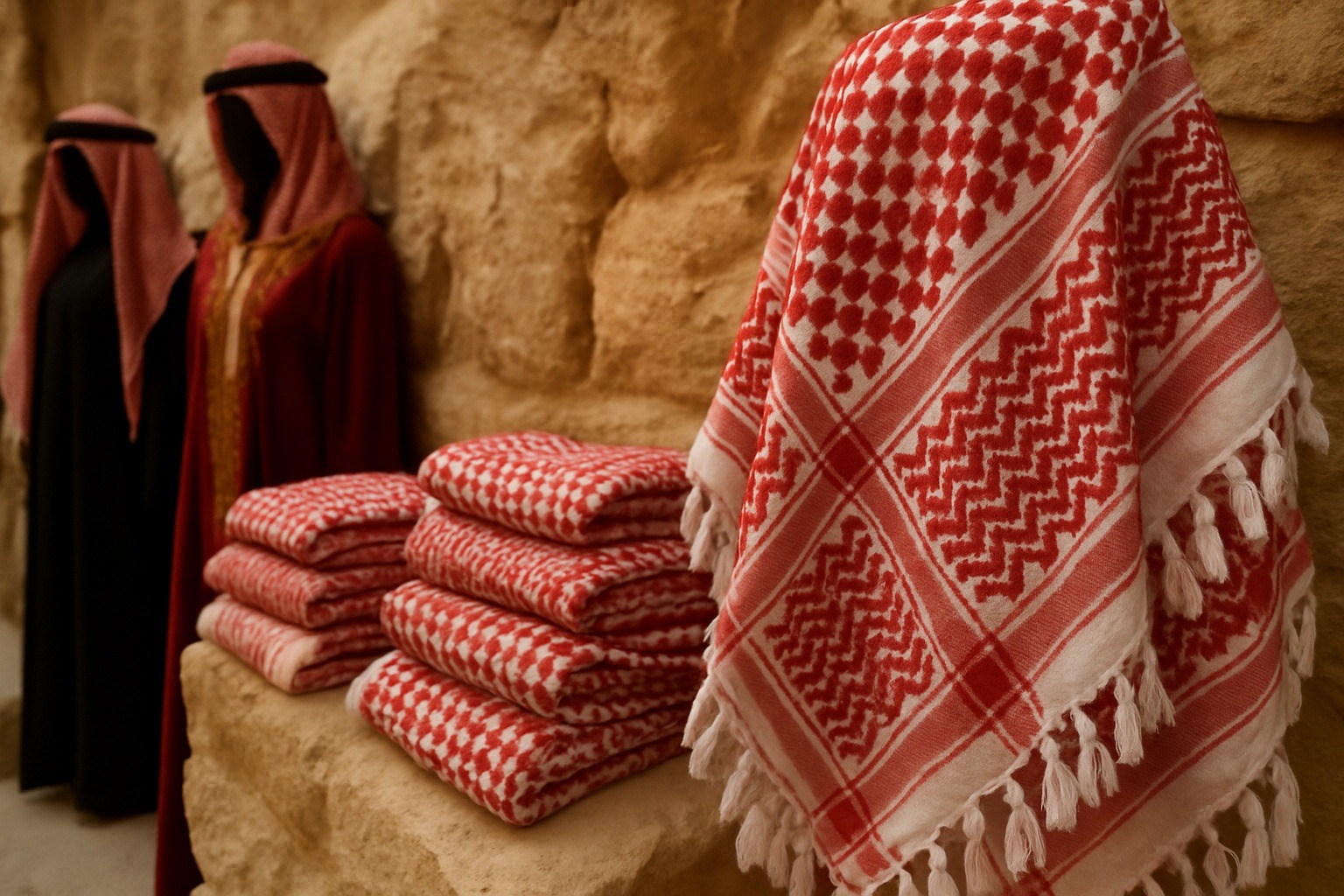
The keffiyeh, or “hatta” as it is locally known, is one of Jordan’s most distinctive traditional garments, typically made from red-and-white patterned cotton fabric. For centuries, desert people have used the keffiyeh for protection from the sun, to shield themselves from dust, and to stay cool. It has also become a symbol of Arab identity and cultural solidarity. In Jordan, the red-and-white patterned version is known as the “Jordanian keffiyeh” and is traditionally worn with a black agal (cord or ring) to secure it on the head.
The keffiyeh is more than just a headscarf; it is a symbol of history, pride, and a sense of belonging. Today, it is worn by both men and women as a fashion and cultural accessory. Keffiyehs can be found in various sizes and patterns in Jordan’s markets, souvenir shops, and handmade craft bazaars. Their lightweight and foldable nature makes them easy to carry. This headscarf is one of the most meaningful and authentic gifts you can bring from Jordan.
8. Mosaic Art Products – Madaba’s famous handmade mosaic panels.
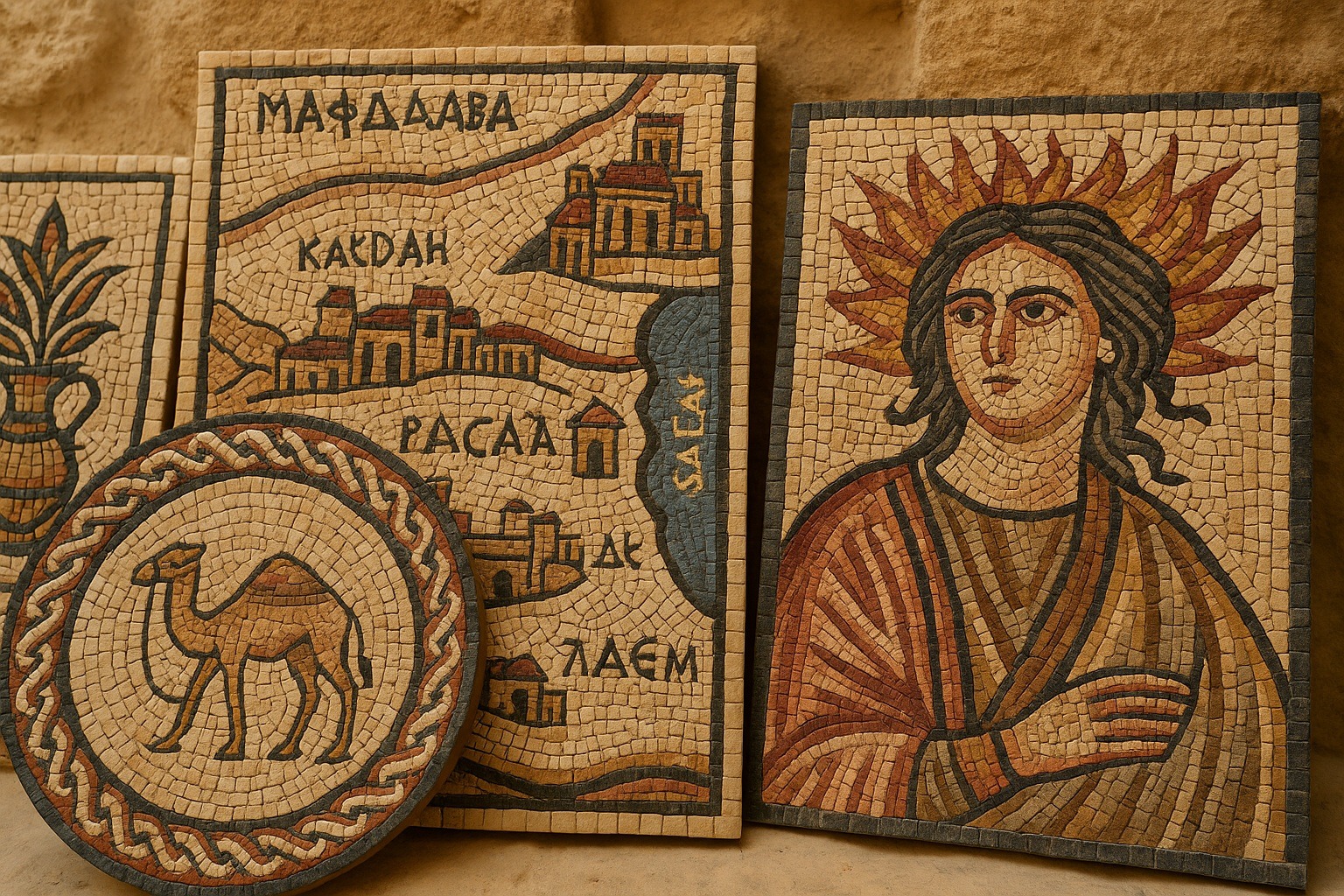
Mosaic art products are among Jordan’s traditional handicrafts, especially associated with the city of Madaba. Known as the “City of Mosaics,” Madaba is famous for its longstanding mosaic tradition that dates back to ancient times. In this city, artisans patiently assemble small, colorful stones to create detailed mosaics depicting religious scenes, maps, geometric patterns, and everyday life. Historical mosaics like the Madaba Map shed light on the deep roots of this craft.
Today, mosaic art products are offered in various forms as souvenirs, such as wall panels, tabletops, trivets, and trays. Since these items are entirely handmade, each one is unique and carries significant artistic value. These mosaic pieces, which you can bring back from Jordan as gifts for your loved ones, are impressive keepsakes both for their visual beauty and cultural meaning. Mosaics found especially in Madaba’s art studios and handicraft markets provide an elegant way to bring Jordan’s historical and aesthetic heritage into your home.
9. Zarqa Ceramics – Ceramic items decorated with patterns unique to Jordan.

Zarqa ceramics are elegant handcrafted ceramic products made in the city of Zarqa, Jordan, decorated with traditional patterns. These ceramics include everyday items such as plates, bowls, pitchers, and vases, as well as purely decorative objects. Jordanian cultural motifs, Arab geometric designs, floral patterns, and blue-and-white tones are commonly featured in their design. Each piece is carefully shaped by skilled artisans and gains a unique appearance through hand-painting.
With their aesthetic appeal and local motifs, Zarqa ceramics blend easily into both traditional and modern decor styles. These ceramics are popular as souvenirs and are among the meaningful and stylish items you can buy for yourself or your loved ones during a trip to Jordan. Typically presented in special boxes, they are easy to carry and packaged to protect against breakage. If you want to bring a touch of Jordanian artistry into your home, Zarqa ceramics are a striking and cultural choice.
10. Zaatar Spice – An aromatic blend of thyme, sesame, and sumac.
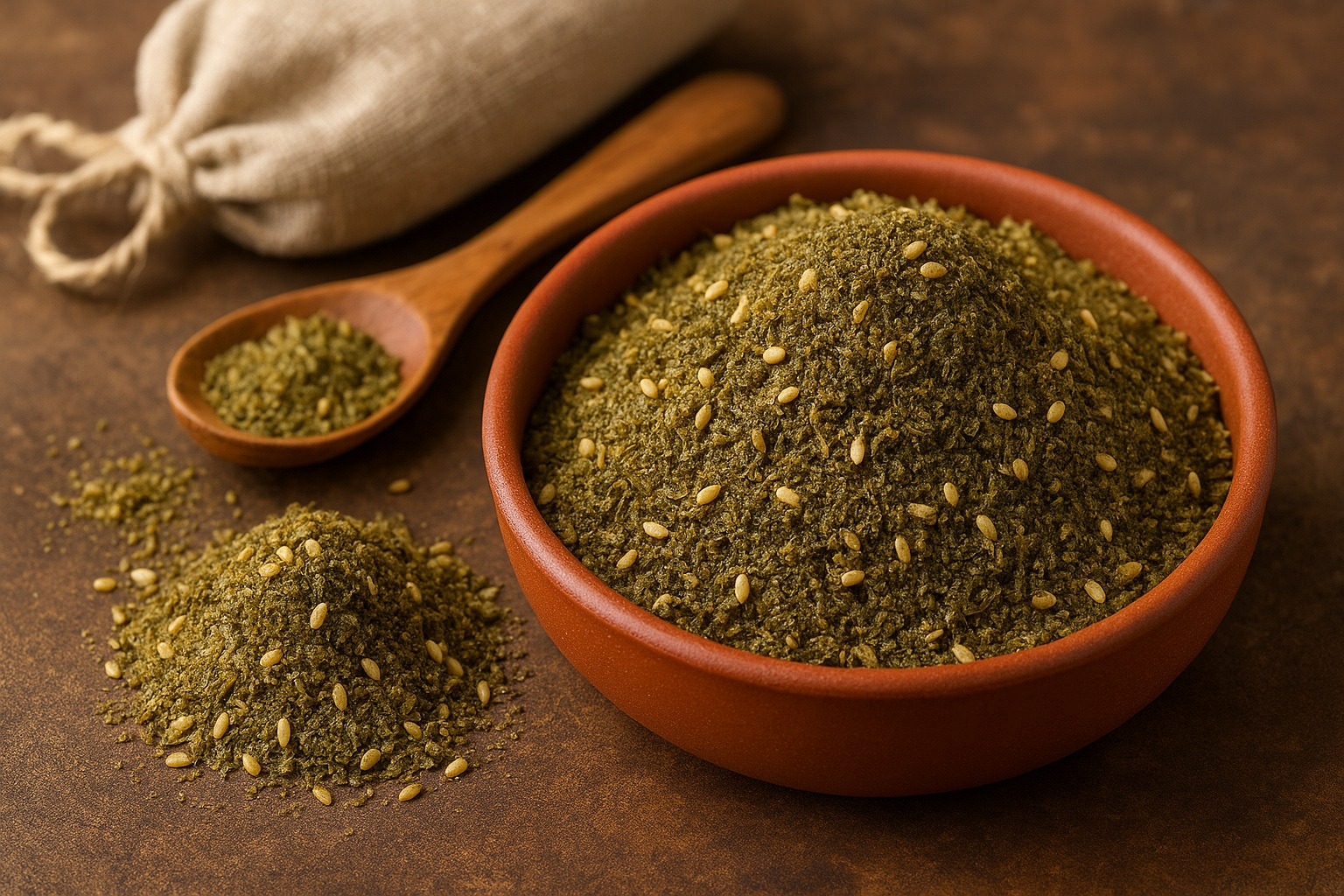
Zaatar is a traditional spice blend that is one of the essential elements of Jordanian cuisine, known for both its flavor and aroma. Its main ingredients include thyme, sumac, and roasted sesame seeds. Depending on local recipes, additional herbs such as salt, coriander, fennel, or marjoram may also be added to give it variety. Zaatar is commonly eaten at breakfast by dipping bread into olive oil and the spice mixture, and it is also used to enhance the flavor of meat dishes, salads, and flatbreads.
This spice blend, found in nearly every home in Jordan, is also known for its health benefits, including aiding digestion and having antioxidant properties. Zaatar is one of the most popular souvenir choices for tourists and is typically sold in fabric pouches, glass jars, or small packages. Its portability and long shelf life make it an ideal flavor-filled memento to bring back from your trip. If you want to bring the traditional tastes of Jordan into your home, a fresh and natural zaatar blend is a great choice.
11. Jordanian Dates – Sweet and fleshy varieties of dates, especially Medjool.
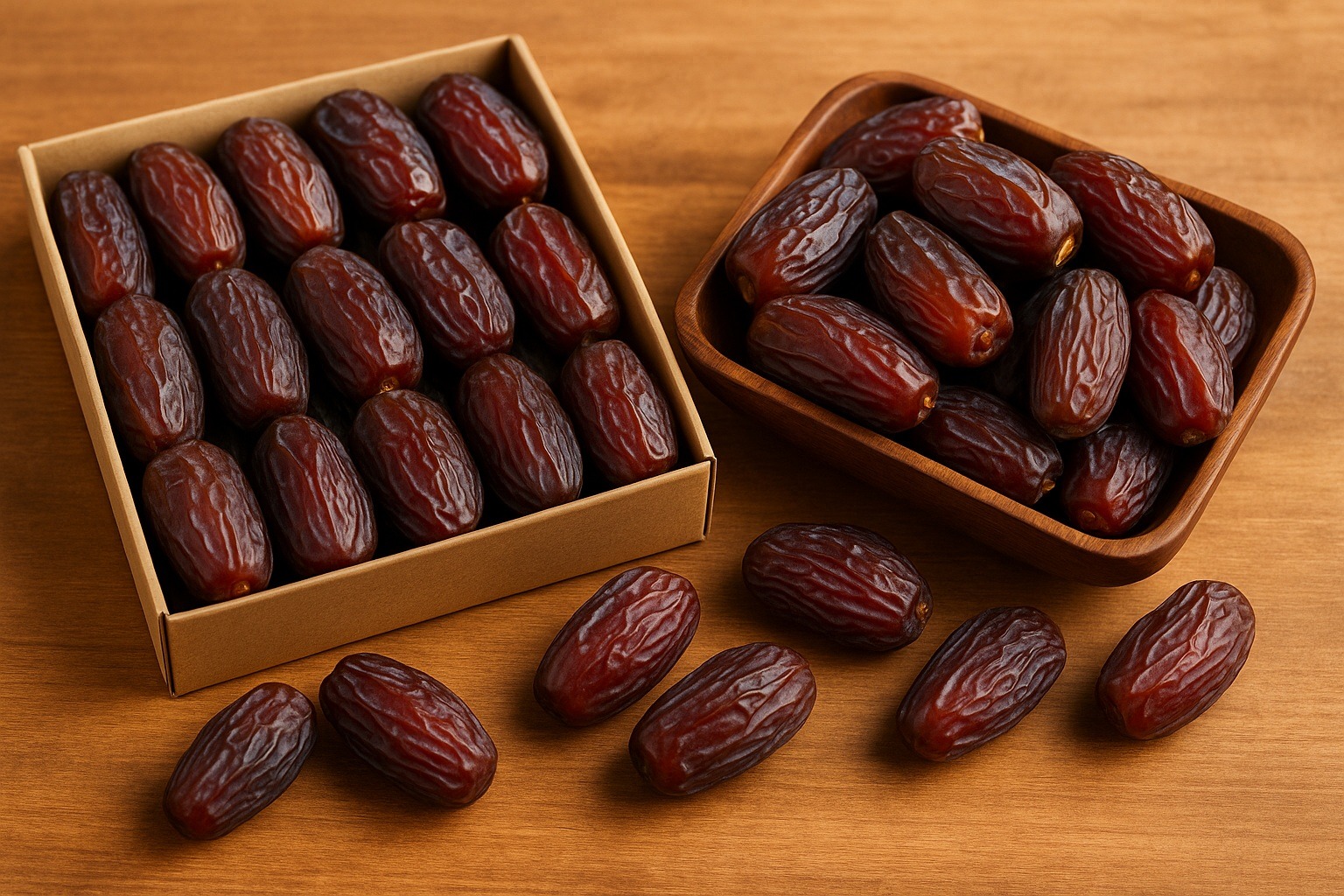
Jordanian dates have gained fame especially for the Medjool variety, which is considered one of the highest quality dates in the world. Known for their large size, soft texture, rich flesh, and intense sweet flavor, these dates are a natural energy source and are frequently used in both traditional meals and modern snacks. Jordan’s hot climate and fertile soil provide ideal conditions for growing Medjool dates. Carefully harvested, particularly from farms in the southern Ghor region, these dates also hold a place in the global market due to their quality.
Highly popular as gifts, Jordanian dates are typically sold in elegant boxes or vacuum-sealed packages. Their health benefits and long shelf life make them an ideal souvenir to bring back from a trip. Dates can be eaten on their own or stuffed with nuts like walnuts or almonds. Additionally, in some shops in Jordan, you can find sweets, spreads, and confections made from dates. With their natural quality and nutritional value, Jordanian dates are a tasteful and meaningful gift option.
12. Copper Handicrafts – Wall art, coffee pots, and decorative items.
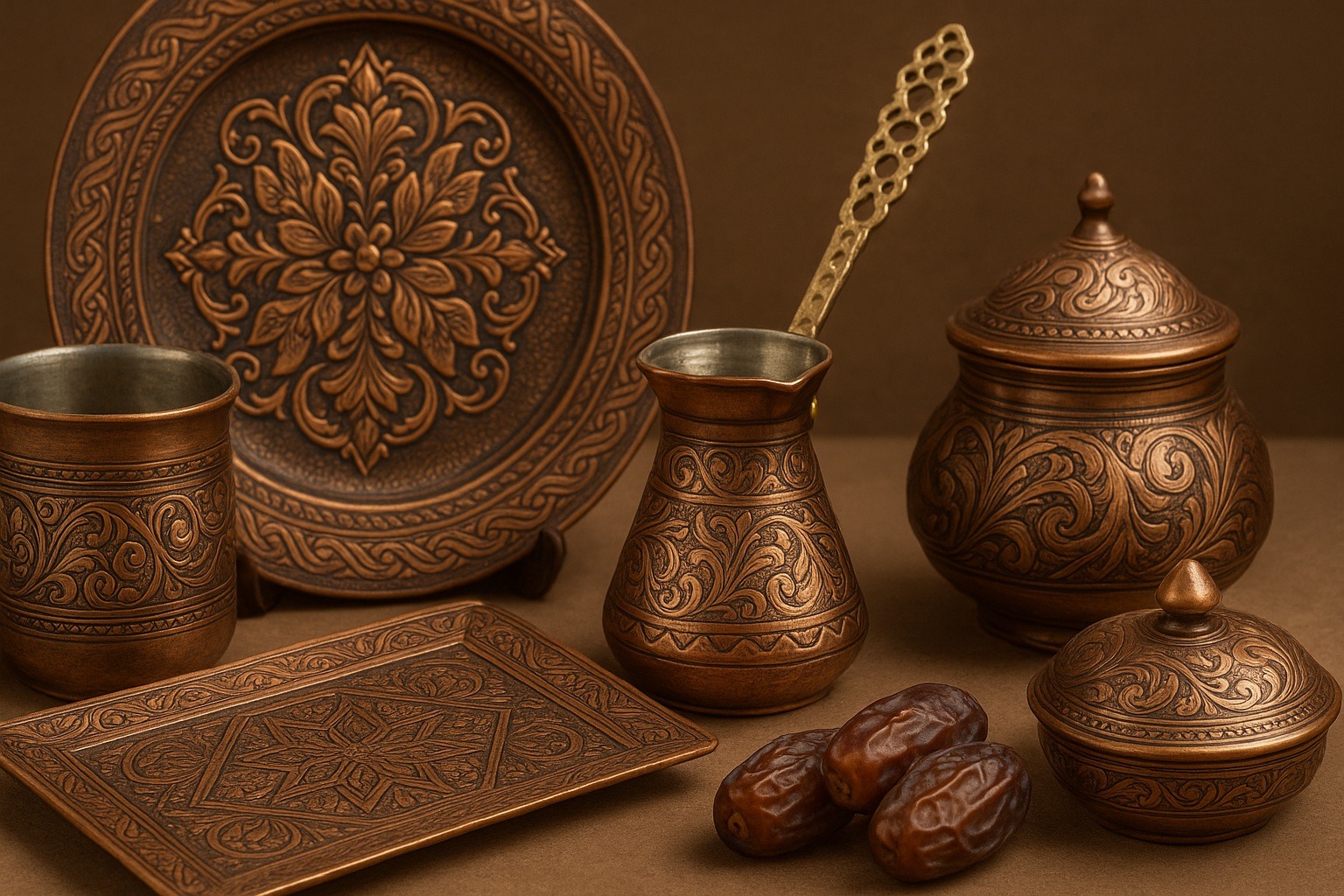
Copper handicrafts are an important part of Jordan’s traditional artisan culture, offering handmade products that combine aesthetics and functionality. These items often feature Arab motifs, geometric patterns, floral designs, and calligraphic inscriptions. Craftsmen meticulously engrave copper sheets to create items such as coffee pots, trays, vases, plates, lanterns, and wall art. Since each piece is handcrafted, it is unique and bears the artistic touch of its maker. The shiny surface of the copper and the intricate engravings give these products an elegant appearance.
Commonly found in tourist bazaars and artisan workshops across Jordan, these items are favored both as decorative objects for home use and as functional kitchenware. Especially items like coffee pots and trays are ideal for traditional coffee service and are highly sought after as gifts. With their portability, durability, and authentic look, copper handicrafts stand out as stylish and lasting souvenirs from a trip to Jordan. These special items, which unite art and culture, make elegant gift options that appeal to every taste.
13. Oud Perfume – Oriental perfume made from natural tree resins.
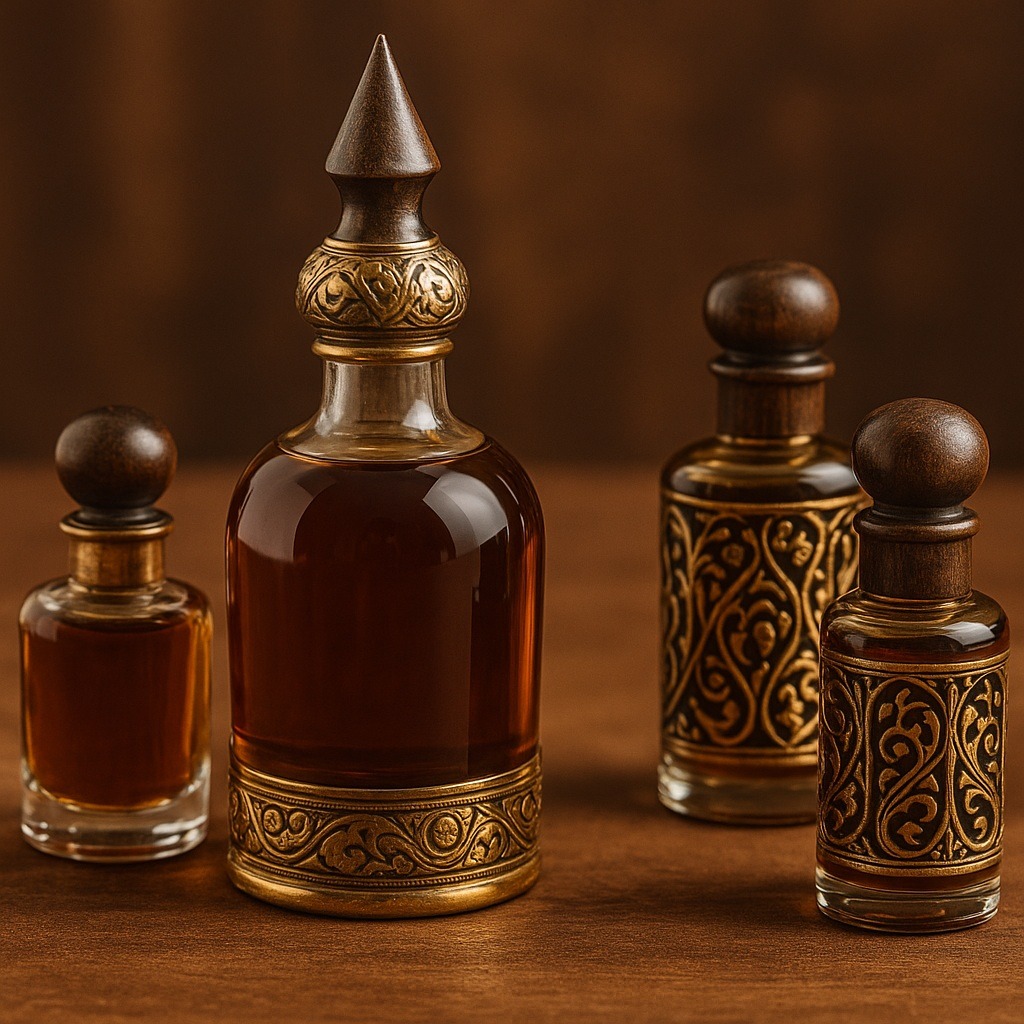
Oud perfume is a highly aromatic fragrance made from natural tree resin, holding great cultural significance in Jordan and throughout the Middle East. Oud, derived from the resin of the agarwood tree, is a rare and valuable ingredient. Known for its rich, woody, smoky, and slightly sweet scent, this essence has been a symbol of luxury and elegance in the Arab world for centuries. Just a small drop of Oud oil can last for hours, and it is used by both men and women as a perfume or body oil.
In Jordan, Oud perfumes are typically sold in special glass bottles and boxes decorated with traditional patterns, making them popular gift items. Available in solid, liquid, or roll-on forms, Oud products are known for their natural composition and long-lasting scent. Personalized blends can also be created in perfume shops, with Oud often combined with musk, amber, sandalwood, or rose essence to enrich the fragrance. One of the most elegant and memorable souvenirs from a trip to Jordan is undoubtedly a traditional Oud perfume.
14. Handmade Soaps – Especially those made with olive oil and Dead Sea minerals.
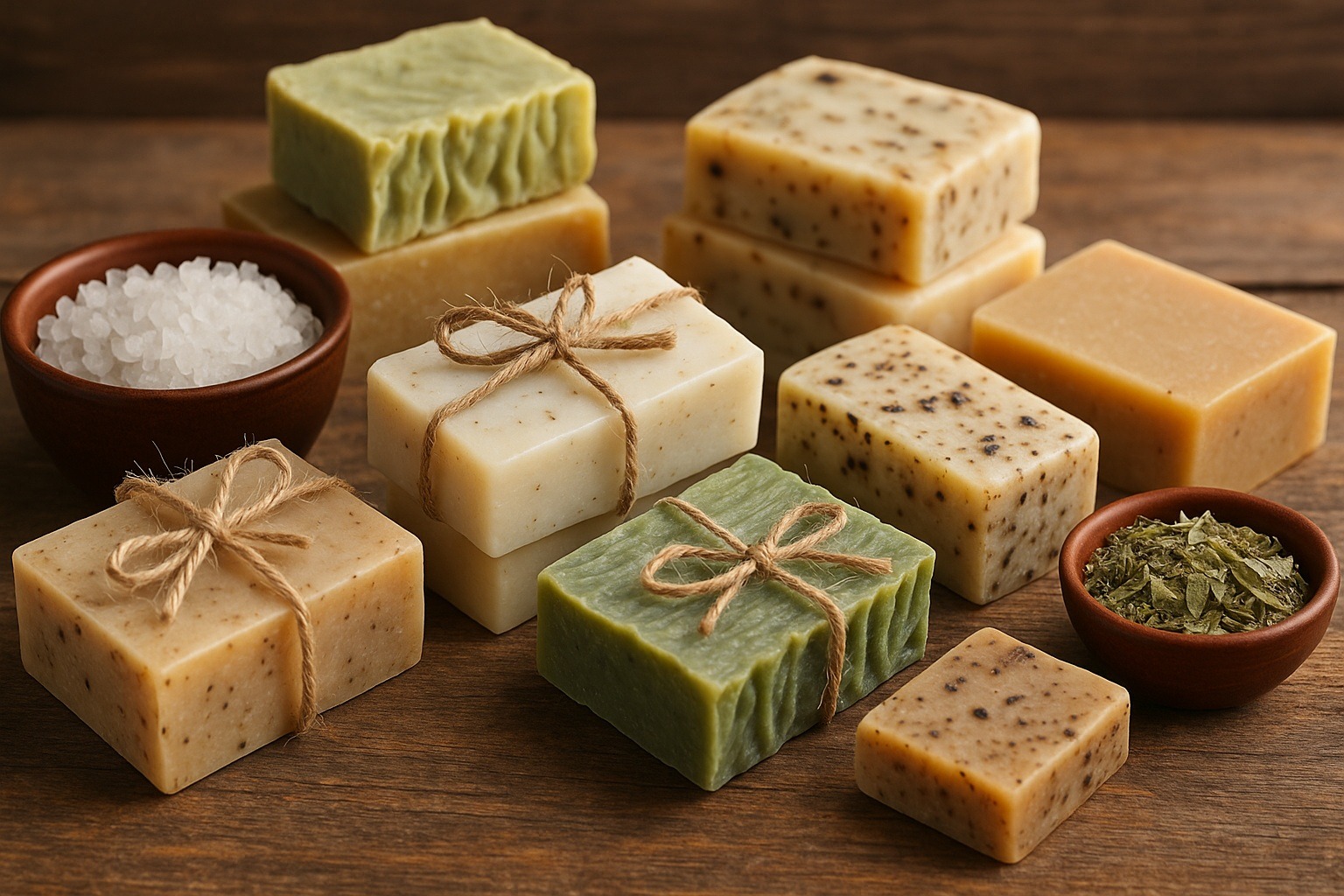
Handmade soaps are among the most special souvenirs that reflect Jordan’s natural resources and traditional production techniques. Olive oil soaps, in particular, are made using high-quality oils derived from the country’s olive groves and are known for their nourishing and moisturizing properties. Additionally, Dead Sea mineral soaps cleanse and revitalize the skin thanks to minerals like magnesium, potassium, and calcium. These soaps are used in daily care and are ideal for sensitive skin due to their natural composition.
In Jordan, handmade soaps are typically crafted using natural methods in small workshops and are enriched with scents from local herbs such as lavender, rose, orange blossom, or thyme. Presented in colorful packaging, rustic string ties, or special pouches, these soaps are visually appealing and easy to carry. Their natural and additive-free nature makes them eco-friendly and healthy gift options. If you want to offer your loved ones a traditional and healing keepsake from your journey to Jordan, handmade soaps are a perfect choice.
15. Tea Trays Decorated with Handicrafts – Made with craftsmanship unique to Arab culture.

Tea trays decorated with handicrafts are symbols of traditional hospitality in Jordan and the elegant presentation style unique to Arab culture. These trays are typically made from brass, copper, or silver-plated materials, with surfaces adorned by hand-engraved patterns. Arab geometric motifs, floral designs, and calligraphic art give each tray a unique appearance. Used for serving both tea and coffee, these items are not only visually impressive but also durable and practical.
In Jordan’s markets and artisan workshops in cities like Amman, Madaba, and Jerash, you can find a variety of these trays in different sizes and designs. Often sold as part of a set with cup collections or coffee pots, these trays are highly sought after as gifts thanks to their elegant packaging. For those who wish to serve traditional Jordanian tea or use them decoratively, these trays offer a gift option with both aesthetic and cultural value.
16. Arabic Calligraphy Panels – Religious or poetic texts written in calligraphic art.
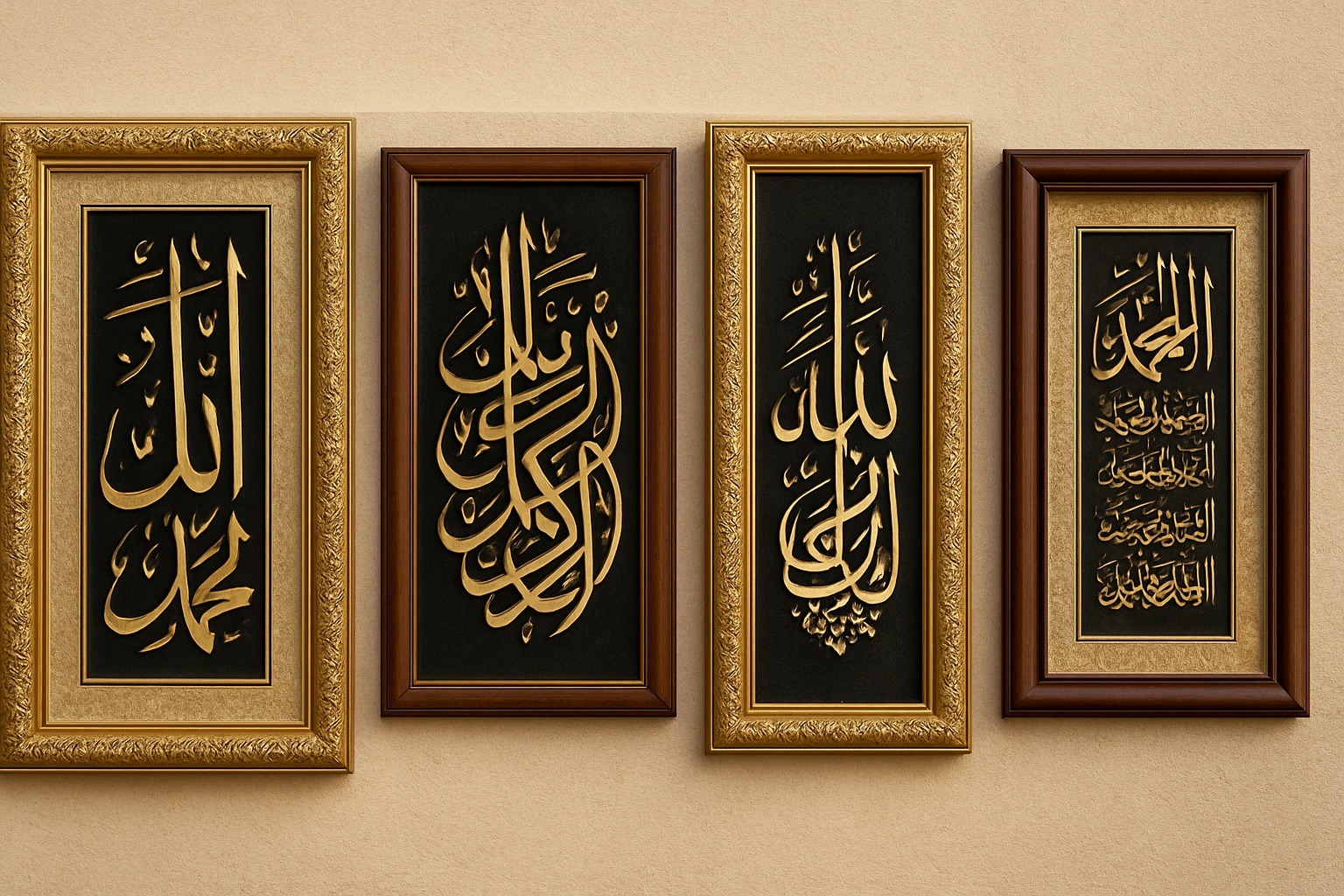
Arabic calligraphy panels are among the most visually and culturally valuable souvenirs, serving as an aesthetic reflection of Jordan’s rich Islamic art tradition. These panels feature handwritten religious verses, hadiths, or poetic lines created by masters of calligraphy. Typically composed in various script styles such as Kufi, Naskh, or Thuluth, the texts are applied to surfaces like wood, leather, stone, or canvas, transforming them into artistic objects. Each letter is not just a writing element, but also a symbol of meaning, balance, and elegance.
Found in art galleries, markets, and artisan workshops across Jordan, these panels are available in various sizes and frame designs. Versions decorated with gold leaf, mosaic frames, or glass embellishments offer a particularly elegant appearance as gifts. These artworks, which carry spiritually meaningful messages, are an ideal choice for those seeking religiously themed souvenirs. Arabic calligraphy panels are among the most refined and meaningful keepsakes one can bring back from Jordan.
17. Jordanian Coins and Stamps – Can be collected as collectibles.
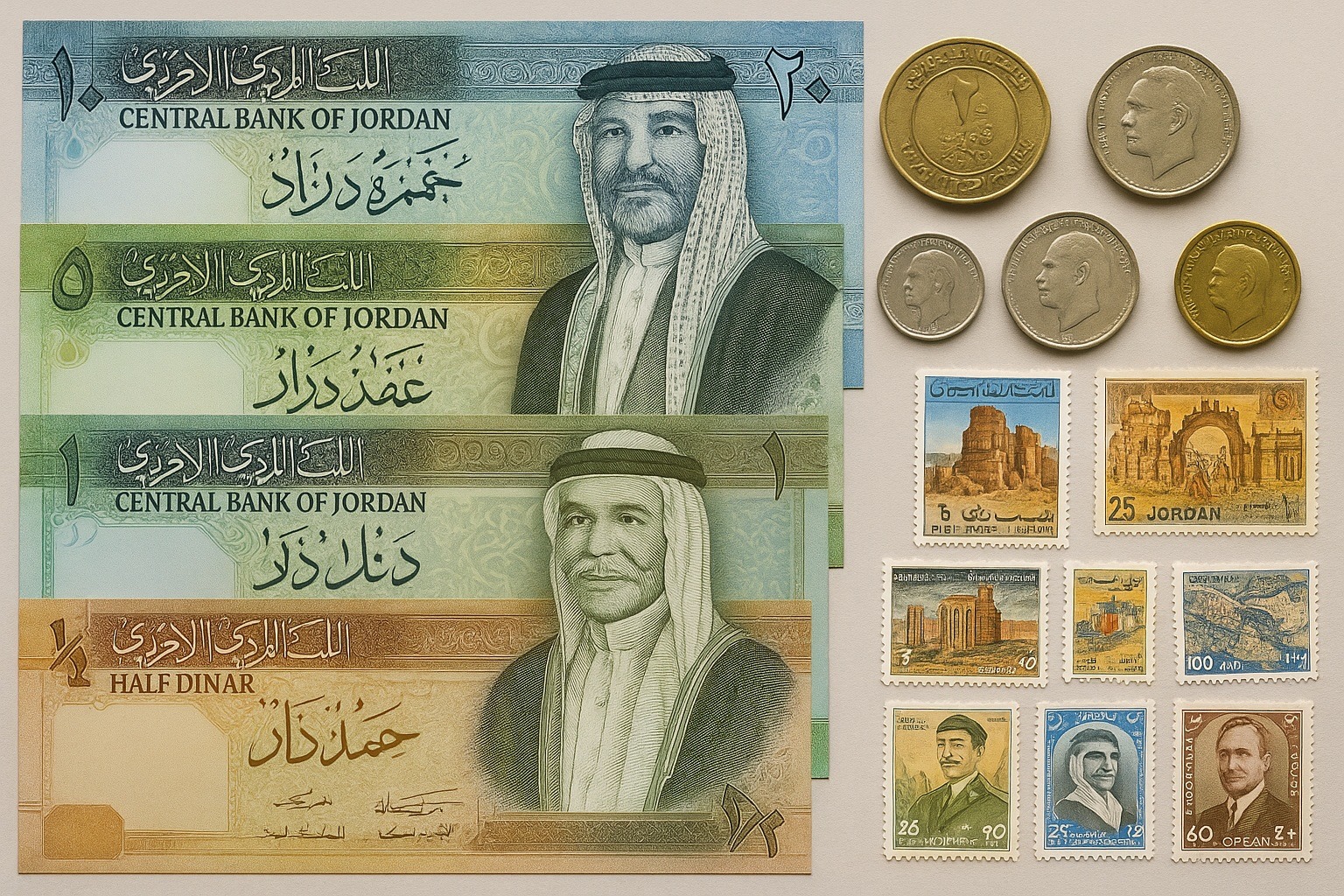
Jordanian coins and stamps are collectible items that hold both historical and aesthetic value. The Jordanian dinar stands out with its unique design; coins and banknotes often feature portraits of kings, traditional patterns, historical buildings, and texts written in the Arabic alphabet, reflecting the country’s cultural identity. Rare coins from older issues and especially limited-edition commemorative coins are highly valued by collectors. Special series released periodically by the Central Bank of Jordan, symbolizing local festivals or historical events, also attract interest.
Jordanian stamps, with their colorful designs and historical themes, appeal to philately enthusiasts. Common themes include Arab architecture, the royal family, ancient cities (Petra, Jerash), natural landmarks, and significant commemorative dates. Stamp collections are typically sold in small envelopes or specially bound booklets. These items can be found at post offices, collector shops, and some museums in Amman. Jordanian coins and stamps purchased before returning from your trip serve as both cultural souvenirs and valuable additions to any collection.
18. Bedouin Rugs and Kilims – Small rugs woven with traditional patterns.
